#AND IN THE LAST EPISODE HE FINALLY ACCEPTS HIMSELF AS A PHYSIC
Explore tagged Tumblr posts
Text
"Tdlosk doesn't have any meaningfulness to it? It's all gags-" YOU MISSED IT!! YOU WERE SO CLOSE!! UR EYES WE'RE CLOSED DURING THE PLAY!! THE QUESTION WAS 2+2 AND YOU ANSWERED 5!! YOU HAD 3 SEASONS AND A REAWAKENED TO STUDY YET YOU STILL FAILED THE CLASS!! THE BED WAS MADE FOR YOU AND YOU STILL SLEPT ON THE FLOOR!! YOU DON'T EVEN NEED GLASSES YET YOU STILL CAN'T SEE THE MENU!!
#kusou's character development may be a slow burn#and we may have never gotten to really see the full extent of it at the end#BUT HOW DO YOU MISS IT??#unless you only watched the first seasoN#HOW DO YOU MISS IT?#EVEN IF YOU JUST WATCH IT FOR THE COMEDY AS MOST DO#HOW DID YOU MISS IT#YOU DONT NEED TO TAKE THE SHOW SERIOUSLY TO SEE IT??#IN THE FIRST EPISODE HE GOES “im the unhappiest boy” BECAUSE OF HIS POWERS#AND IN THE LAST EPISODE HE FINALLY ACCEPTS HIMSELF AS A PHYSIC#IT ISNT ROCKET SCIENCE#tdlosk#the disastrous life of saiki k.#saiki k
166 notes
·
View notes
Note
(TW: miscarriage mention)
I’m a bit hungry for some angst. How do you think the other variants would react to one of the pregnant Marks having a miscarriage?
If I was boring, I'd say that it was prisoner Mark who has a miscarriage. But, just for fun, what if its sinister Mark? Like, eating so much human flesh over time, and all his usual violence and games can't be good for pregnancy, right?
This would most likely happen during his first pregnancy, when he doesn't really take it too seriously or care too much about his diet and safety. Imagine his surprise when he starts bleeding, stuff starts hurting, and that life he could feel inside him is gone.
I think it takes him a good while to like, accept it. Sinister seems to be the type to also lose it when the other Marks start caring for him, even if it's just checking up on him, because he sees it as them pitying him.
Sinister isn't the most stable guy, so he might also start having a whole episode about some of the others still being pregnant and he isn't. For a good while he just falls back into anger, and the reader and other Marks would have to talk him down.
In the end, emperor Mark is the one who needs to hold him still cuz hes just physically stronger, as reader has to really get it into sinisters head that it's okay to be sad, to be hurting, but he shouldn't let that out on the rest of them.
Sinister Mark still doesn't like appearing weak, but it would end up with him just finally letting go and sobbing about it, cuz he feels like such a damn failure.
I personally have no experience with miscarriage, so i don't want to say a whole lot about what Sinister Mark does to heal from it, and to stop blaming himself.
But the other Marks would be more kind, for a while lmao, until he's back to himself. And would let sinister take part in their pregnancies and kids. This also means Sinister might be one of the last Marks to have his own kid, cuz reader and others help him understand he should heal first before trying again, ya know?
#gator rambles#tw miscarriage#pregvincibles#petvincible#mark grayson#invincible#male reader#alternate mark grayson#evil emperor mark grayson#sinister mark grayson
138 notes
·
View notes
Text
augh. rewatched btvs 5x22 scene where spike & buffy go to buffy's house to get weapons before the big showdown. them having to retrieve weapons is such an amusingly flimsy excuse to have them go to her house so we can have the scene where she invites him in + he promises to protect dawn + "i know you'll never love me" speech. i love a paper-thin excuse to put 2 characters in a room together. especially when those characters are buffy and spike!!!!!!!!!!!!
it really is so striking the way spike refrains from asking buffy to let him in even though he would be perfectly justified in doing so as it's obvious that buffy has forgotten he's not allowed in. i think part of it is that he wants to make it clear that he will respect the boundaries she has set with him. but i also think part of it is that he doesn't wanna feel the pain of being rejected again, because that fucking hurt. if he doesn't ask then he doesn't have to hear her say no again. it shows how head over heels he is for her and how much he has changed since the beginning of the season, when he was challenging her boundaries so much.
spike's expression when he's walking thru the doorway......it's so endearing and some really great acting from james marsters. first surprise and disbelief, then glee which spike is trying very hard to restrain because these are grave times. and yet he can't help feeling so joyous that buffy trusts him. he glances as the doorway like he's thinking "ah yes what a nice house" which makes me laugh because it's so stupid but also sweet. i think it's him trying to play it cool and doing a not so good job of it. there's such a lightness to him - it reminds me of the feeling when you think you did something to upset your friend a few days ago and you're anxious that they've been angry with you all this time and you finally gain the courage to ask them about you and it turns out they were never angry or upset at all. the giddy relief you feel.
and then there's that little moment of tension where they're standing so close together and you think something might happen but then spike breaks off and goes to the weapons chest and starts rambling about what they should take. it's so notable that it's him who gets nervous and moves away. so different from the way he behaved with her in fool for love, getting up in her space and trying to make her admit she had feelings for him. he's accepted that she'll never love him back, and moments like this where it feels like maybe there could be something between them are too painful, so he disrupts the moment. moves away.
jumping to the end of the scene - i love that buffy is on the stairs when spike does his little speech. she's physically above him. "you're beneath me." not only that, she's ascending, just as she ascends at the end of the episode, accessing a level of heroism that spike will never be able to meet. rewatching this part, spike's expression really surprised me. when he says "i know you'll never love me," he doesn't look at all bitter or resentful. his face is open, understanding, compassionate, and thankful. because that's what this speech is - he's thanking her for treating him better than he deserves. he's so grateful for the respect and trust she has given him. it has been truly transformative, as we've seen. only he doesn't get to the actual thanking part, because he cuts himself off, saying he'll wait for her down here. i think he cuts himself off because he realizes that this isn't what buffy needs to hear right now. she's got an enormous battle to prepare for, and a sister to save, and spike's feelings simply aren't important. so he stops mid-sentence for her sake. i think we're meant to understand that the only reason he started to say this at all is that he really thinks he might die tonight and it could be his last chance to let her know what it has meant to him to be treated like a person capable of doing good.
i've focused on what's going thru spike's head in this post bc i think buffy is a lot harder to read here. which is interesting bc sarah michelle gellar as buffy is so expressive that usually you can always tell exactly what buffy is thinking. but when she's with spike in these episodes toward the end of season 5 it's difficult to tell how she regards him. i think a lot of the time even she doesn't really understand how she feels about him. their relationship is so paradoxical. she relies on him but she reviles him. she wants him around but she finds him intolerable. i might rewatch the scene again and make another post about what might be going thru buffy's head, but for now i'll leave it at saying that i kind of love how spike's feelings for buffy are crystal clear to us and buffy's feelings for spike are much murkier. spike started out as this cool mysterious antagonist, whereas buffy has always been the protagonist and we're constantly seeing things from her point of view and being made to understand how she feels. so it's kind of fun to see that flipped a little bit. and it also rings really true for me how buffy in this moment is like, i have 5 billion things to be worrying about right now, i cannot even begin to process whatever feelings i may or may not have regarding spike. and with all of that said........there really is a softness to the way she treats him in this scene. and it's nice.
anyway. these two ✌️ gonna go jump off a tall tall tower
310 notes
·
View notes
Note
for those of us casuals who abandoned ship when robert left, how would you describe the changes in aaron’s character since we last saw him?
he seems in some ways more emotionally open in his relationship, at least as far as saying i love you more frequently and easily, and getting married to someone he’s known 9 months. but i read he came back a chas-anti and that losing liv (and robert) made him harder.
hes in a marriage which is clearly not long for this world so not sure how much of his vibe rn is his new vibe or is john specific?
Aaron has had a lot of misery and trauma to deal with in these last six years and I think he's been really beaten down and exhausted and I feel like the idea of John represented a little bit of hope for him but I feel like a lot of his "emotional openness" that you've been seeing in these last couple weeks is more to do with the fact that A) he's trying to convince himself he loves John and B) it's easier to say to John because he doesn't feel it as deeply.
His post Robert spiral was rough. He was just doing anything and everything to try and feel something. He was so broken and it was very sad. There were lots of reckless hook ups, drinking, lots of crime with Cain. Then he also lost access to Seb, which just broke him more. Seb was like this last shred of hope and that life he lost that he could hold onto and that was taken from him too.
I think the lockdown episode where he got that letter from Robert settled something in him for a bit. It let him know that Robert really did love him and it allowed him, for plot purposes to say that he would always love Robert but if the chance to move on came around, he felt like he could take it now.
Then he meets Ben. I don't think he had nearly the same emotional openness with Ben as he appears to have right now with John. I don't even think they did their cringe in unison "I love you" until just before Ben was about to be paddled to death. Also Covid meant they blessedly had very little physical affection. Plus the most emotion Aaron showed during that whole relationship was when the idea of Robert appealing came up and he "chose" Ben over the potential heartbreak of Robert not winning said appeal.
During the Ben era, they also did the Liv alcoholism story, which really exhausted Aaron even more. He was trying so hard to help her and she just was not in a place to accept that and their relationship got even more toxic than it had ever been before to the point where they actually finally acknowledged it when he was going to move away with Ben. And he left on very bad terms with her because he thought she'd killed Ben.
So then he's all "this place hasn't been the same since Robert went to prison" and he goes off to hang with Adam on the run, which apparently landed him in Italy where he met off screen Marco. Now we know nothing about Marco, except that Aaron was apparently happy cause you know...he was off screen and the angst plots couldn't get him there. But I would imagine that getting out of the village and all of the memories was probably really helpful for him at the time.
Then he came back for the 50th anniversary. He reconciled with Liv but then she died and that was horrible for him. He also discovered Chas's ongoing affair with Al, which is why she forced Aaron out of the village on the day of Liv's funeral because she wanted to keep her secret.
Then Italy wasn't so great for him anymore. He was grieving and spiraling and off screen Marco was not a good support system and broke up with him. He was apparently being reckless enough to steal 30 grand from the Italian mafia and worried Adam enough to call Cain.
So Cain and Caleb drag him back and hold him hostage basically in a barn. This Aaron was a mess. He was very much a Chas Anti because he blamed her for Liv's death. Her meeting with Al during the storm got her injured and Paddy wanted to go see her in hospital and sent Liv out into the storm to check on Eve, which got her crushed by the caravan. And then he also blamed her for taking away his support system when grieving her death. And brought up a lot of stuff from the past if I recall. But he was mostly blaming her for Liv's death so all of the other very valid complaints kind of got swept under the rug.
Anyway, he was pretty awful to everyone. He was mean to Sam, to Paddy, to Vinny. He had a whole thing with Cain that resulted in them trying to beat each other up and landed Cain in hospital with some brief, curable for the plot, brain damage. Everyone hated him and wished he'd never come back even though they had dragged him back.
Then Chas got cancer and he was like "great I'm going to lose someone else maybe" and he tried to run away and leave again. Mack tracked him down and they had a long chat about how Aaron couldn't stand to lose another person, go to another funeral etc and how he was putting on this act of not caring because it was easier than getting close to people and then losing them. That last part feels pretty poignant to now.
So after that chat, he came back and reconciled with Chas and then stepped up to help her with her treatment and recovery and everyone else eventually stopped hating him completely. He settled down a bit again. But he was still pretty empty and didn't have a lot going on. (I'm still working my way through some of his 2024 stuff). I just got to the part about him telling Chas he is positive for the cancer gene and talking about how he doesn't want to die.
And then just before the John stuff started, he had apparently decided to get back on the apps so he was starting to open himself up to the possibility of meeting someone and moving on.
And then he met John. And he hated him at first. Didn't want to even go there because of all the Robert stuff his presence brought up. But then the Plot must Plot so he did go there. But he wasn't very emotionally open with him either at first. And John basically had to manipulate a half hearted "I think I might love you" confession out of him by lying about his Aiden trauma some more.
He didn't really start being more open about telling John he loved him until after John had helped out with the Anthony stuff and disposed of the body when Aaron thought he'd killed him. And I think that A) led him to be very grateful and B) led to John manipulating him more and being like "this is what people in love do" etc. And I think that led to Aaron saying "I love you" a lot more.
And now, like I said at the top of this very long response, I feel like he's saying "I love you" a lot more because he's trying to placate him and also convince himself and because it's easier to say to John because he doesn't love him the same way as Robert. He tells Robert "it's just words" when he tells him he still loves him but that's what I would call it when he tells John he loves him.
I do think he wants to love John. I think he thinks it would be easier if he could just be with John and spare himself the risk of utter destruction if he let's Robert back in and loses him again.
So I guess, all this to say, I don't think Aaron is suddenly better with expressing his feelings or that he'll be telling Robert he loves him all the time or whatever when they get back together. I feel like Aaron regressed in a lot of ways post Robert, partially because they didn't know what else to do with his character. So I think him learning to trust Robert again, to trust love again, would actually be good growth for him.
#ed asks#robron#aaron dingle#emmerdale#sorry this got soooooo long#haha#aaron has had lots of trauma
86 notes
·
View notes
Text
God that scene in the last episode was just…
The way Charlie physically closes himself off and Nick sits at his level and gently pulls him back open again
The way Nick literally holds Charlie’s hand through the conversation
The way Charlie allows himself to trust Nick
The way Nick looks so heartbroken that anybody made Charlie feel bad about himself
The way Charlie makes the decision to tell Nick about his SH
The way Nick realizes there’s even more going on than just Charlie’s ED and braces himself to hear it
The way Charlie allows himself to admit his feelings and acknowledge that he doesn’t deserve to feel like that anymore
The way Nick can’t help but hug him
The way Charlie grabs him back and buries his face in Nick’s neck
The way Nick is trying not to cry/be strong for Charlie
The way Nick’s head falls in relief when Charlie said he doesn’t hurt himself anymore
The way Nick won’t allow Charlie to be sorry for this
The way Nick doesn’t put him down or tell him not to do it again, but instead makes Charlie promise to tell him if it gets that bad again
The way Charlie still thinks he’s a burden
The way Nick looks so sad that Charlie would think that of himself
The way Nick gently reassures him that he could never see Charlie as broken or a burden
The way Nick is showing how strong he thinks Charlie is
The way Nick wants to be Charlie’s rock because that’s what Charlie is to him
The way Nick is struggling not to cry
The way Charlie finally accepts that Nick really just wants to help him
The way Nick cradles Charlie’s face
The way it looks like he’s going in for a kiss but is actually going to the forehead for the most tender kiss
The way he immediately goes to rest their foreheads together, just exuding ultimate comfort
The way he goes in for a sweet kiss
The way he’s almost ready to say “I love you” but is interrupted
The way he knows it’s not the right moment
The way Charlie knows anyway
The way Charlie looks like he can’t believe any of this is happening to him, that it’s real, that someone loves him
The long, slow, sweet kiss goodbye
The way neither of them want to leave each other
The way Charlie lingers in the driveway
The way Nick takes a deep breath and lets himself really feel everything once Charlie’s gone
The way Charlie is ready to say “I love you” back
Joe and Kit acted their asses off for this and I’m so so proud of them
#I did not mean for this to be a play by play analysis#it got away from me#heartstopper#heartstopper spoilers#heartstopper netflix#heartstopper netflix spoilers#heartstopper s2#heartstopper season 2#heartstopper series#heartstopper nick#heartstopper charlie#nick nelson#charlie spring#nick and charlie#nick x charlie#joe locke#kit connor
2K notes
·
View notes
Text
The Greatest Temptation of Dipper Pines
Dipper Pines isn't just my favourite character in Gravity Falls, he's one of my favourite fictional characters of all time. He ranks up there with Spider-Man and Batman, the heroes of my childhood who brought me great joy and comfort as I watched or read about them valiantly making the world a better place at the risk of their own lives and happiness. I like to think those stories encouraged me to be a better person as much as they entertained me.
But I know that Dipper Pines has made me a better person.
I, like many fans, see a lot of myself in Dipper, especially my younger self. Sometimes I even say he's the boy I want to grow up to be more like. Part of why I like him is because he's not superhuman like so many other heroes. In fact, he's physically the weakest of the main characters, and while most consider him to be quite intelligent it's not to the superhuman degree of Ford, or entirely unbelievable in someone of his age.
But I'd argue Dipper's greatest asset isn't his intelligence anyway, it's his wisdom.
We see Dipper's journey throughout the show, facing many of the usual things people his age deal with and far, far worse. Bullies and abominations, dismissals and demons, first loves and near death experiences. And he repeatedly makes mistakes, sometimes causing bad situations or making them worse. But he learns from those mistakes. Mostly. He's not perfect.
For all I praise his heroics and determination, he easily gets in over his head and puts himself and others in danger. Both his ego and his insecurities can cause as many problems as his brain can solve. And while Dipper is a good person with a big heart for the most part, other times he's a straight-up jerk.
But as I said, that's part of what makes him so great. Because it's not our flaws that define us, it's how we accept and overcome them, and the good we do despite them. And Dipper Pines knows better than anyone else how flawed he is, with his self-doubt being a recurring theme of the show and central to several episodes. Whether he's lamenting his height, masculinity, age, muscles, voice, or something else, he eventually learns not to dwell on his faults and tries to accept them.
And while he's faced many tests that prove him to be a hero (even if his insecurity won't let him fully acknowledge it for long) there was one scene in particular which I think shows just how dedicated Dipper Pines is to doing the right thing. No matter how much it might hurt him to do so.
When Bill gained physical form he wrought havoc upon Gravity Falls. He transformed the town Dipper had grown to love into a hell on earth. He turned Ford into gold and burned the cherished journals in front Dipper's eyes, then offered him as a snack to two of his minions, forcing him to run and hide.
For three days a twelve-year old boy survived an apocalyptic wasteland that was ruled by monsters and nightmares that were trying to capture, kill, or eat him. And all that time he was wondering about his family, trying to reach his sister on a walkie-talkie that never answered back.
Then he found Wendy, one of the few remaining people living outside the safety of the Mystery Shack. After days of surviving who knows what they had finally found a friend to share the apocalypse with. Wendy recounted how she'd lost the rest of her friends in the initial wave, seeing them turned to stone in front of her eyes. Dipper guiltily confessed that he had no idea what happened to his family but his last interaction with Mabel had been a fight over Ford's offer of an apprenticeship.
And at his lowest point, when he's doubting his ability to do anything against such odds and if it's even worth trying, Wendy offers him the encouragement he needs to continue the search for his sister and comes up with the plan to steal a car and get them to Mabel's bubble.
This plan is almost thwarted by the appearance of Gideon Gleeful and his newfound prison friends, now working as Bill's enforcers as they prowl Gravity Falls and capture the remaining townsfolk. But the pair escape by driving through bubbles of madness and over a crevice, though the car is totalled in the process. Which leads to one of my personal favourite Dipper moments:
Right after they crash the car, clearly injured from the impact, Dipper crawls out of the vehicle and drags himself on his elbows and knees towards his sister's prison, urging himself forward and ignoring how distant it is.
Despite everything he's just endured and everything else he's been through that day and the days before, Mabel is foremost on his mind and he refuses to stop. Call it bravery, love, willpower, endurance, stubbornness, all of the above, whatever. For a brave young boy who's faced peril countless times, I think this was a defining moment. One that shows exactly how committed Dipper is to his family.
And when things are looking bleak, he finds Soos, who immediately helps him up then attends to Wendy's injuries. But the relief of finding another friend in a moment of need is short-lived as they are surrounded by Gideon and his Discount Auto Mart Warriors, who summon Eye-Bats to take them away. And here, so soon after one, comes another of my personal favourite Dipper moments.
Gideon Gleeful has been a thorn in Dipper's side since the start of the summer. A dark reflection of what Dipper could have been if he'd prioritised himself over everyone else. He's repeatedly threatened Dipper and his family. He came this close to forcing them to leave town. Worst of all, he'd consistently tried to make Mabel his, despite her wishes.
And how does Dipper deal with his foe? By talking to him. Using logic and sympathy, urging Gideon not to think of himself for once, but of Mabel and what's best for her. Dipper uses his own experience of unrequited love to convince Gideon to do the right thing. He encourages him and his gang to go against Bill, to prove the eldritch entity wrong about there being no more heroes and show that people will still stand up to him. It's also this scene that holds my single favourite line of the entire show:
"You can't force someone to love you. The best you can do is strive to be someone worthy of loving."
This line has impacted my life greatly. They were the words I needed to hear right when I needed to hear them the most, and it's a lesson I keep close to my heart. In many ways, I am the man I am today because of Dipper Pines and because of this line in particular. With it, he convinced me to become a better person for my own sake and not in the hopes of appealing to others.
And it was enough to convince Gideon too.
For possibly the first time in his life, Gideon Gleeful puts someone else before him. Not because of threats or trickery or violence, but because his enemy spoke to him with compassion and empathy. And, despite the fear of death or worse, Gideon, with the support of his prison friends, agrees to go against Bill, and give Dipper, Wendy, and Soos the time they need to reach the bubble and find Mabel.
It's one thing to learn from your own mistakes. It's something else to turn an enemy into an ally by teaching them not to make those same mistakes. If that isn't a sign of wisdom, I don't know what is.
And it's thanks to Gideon's last minute sacrifice that the trio manage to make their way to Mabel's prison, holding hands as they step into the unknown together, ready to save their friend. And it's here they face what Bill calls the most diabolical trap he's ever created: constant 80s background music.
Also, the ultimate desire of whoever enters it, compelling them to forget the outside world and enjoy themselves while everyone else suffers at Bill's leisure.
That's bad too.
Anyway, when we last saw Mabel, she'd had what she called the worst day of her life. She'd been looking forward to her and Dipper's thirteenth birthday, eagerly anticipating what she thought would be a great party to close a wonderful summer, surrounded by her greatest friends and new family as they entered their teenage years together.
Instead, she was repeatedly disappointed, her expectations and hopes shattered. First, Stan refused to let them host the party at the Shack because of the damage caused during Scary-oke. So as an alternative, Soos takes her to rent out the high school gym where she finds Wendy, who reveals that growing up and attending high school are not the light-hearted experiences television had led Mabel to believe. Instead of the romances and wacky adventures she was expecting, Wendy warns her young friend about difficult classes, puberty, peer pressure, and constant stress, even telling her to avoid growing up if she can. It's enough to make even the normally overly-positive Mabel concerned about turning thirteen and what follows after.
Trying to cheer her up again, Soos takes her to see Candy and Grenda, only for Mabel to find out that neither of her BFFS will be there to wish her happy birthday or even say goodbye to her when she leaves town. The two people she promised would always be her best friends, who were with her when she fought the Summerween Trickster and an arachnamorph, the ones she called 'her people' when they first met. Without her best friends, she loses all excitement for her and Dipper's big day and begins lamenting the end of summer.
And for the final and worst time of that day, an attempt to help inadvertently ends up leaving Mabel feeling worse than before as Stan tries to cheer her up by advising that, whatever happens, she would always have her brother. Only for her to hear moments later that Dipper plans to stay in Gravity Falls, leaving her to face the now miserable future on her own.
This leads to a confrontation with Dipper that leaves Mabel so distressed she runs sobbing into woods to get away from her issues. It is here, at her lowest point, that Bill arrives, inhabiting the body of Blendin Blandin. Always an opportunist, Bill takes full advantage of Mabel's despair and uses the body of someone she not only knows but helped when last they spoke.
He offers assistance to a little girl crying alone in the woods. Reminds her that he has power over time itself, and promises her that he can help her like she helped him. All she has to do is give him one little trinket that won't even be missed and he can fix her problem, giving her that little bit more time and delaying what moments ago seemed despairingly inevitable. He even pressures her a little at the end, asking if she was ready to leave Gravity Falls and knowing she wasn't.
Because it would mean an end to summer and the innocence of childhood, without her friends or brother to help her through it.
And when she gives him the rift, Bill follows through on the twisted deal and sends her to Mabeland, where none of that mattered. The world was bright and colourful, full of life and joy and laughter. Here, she didn't need to worry about growing up or leaving childhood behind. Summer was eternal and whatever she desired came to be, sometimes before she realised she wanted it. She didn't even have to say goodbye to Dipper, at least not fully. It came with it's own version; one who would support her, whatever her decision, and never leave her behind.
With all that in front of her, why would she ever turn her back on Mabeland? Especially when there was nothing but uncertainty and heartbreak waiting for her outside.
A lot has already been said about Mabel and Mabeland. How so much of it is surface level and appeals to Mabel's childish and sometimes immature nature. Stuffed animal trees, waffle guards, glitter rain, and dream boys. And a lot has and can also be said of Dippy Fresh in particular. A skateboarding, quote-unquote 'cooler' version of Dipper straight out of something from a cringe-worthy show from the 90s. Mabel's description of him is especially problematic since she calls him a "Backup Dipper with a more supportive attitude."
Dipper in particular hates his colourful doppelganger; stating so in the courtroom, glaring at him constantly, and even snaps his neck in an infamous deleted scene.
But it is important to keep in mind that this is a trap set by Bill. A multiversal threat older than our universe. But one who, as he says in The Book of Bill and Dipper's and Mabel's Guide to Mystery and Nonstop Fun!, likes Mabel. So while his trap is a far less torturous than many were expecting, it is still a trap and Mabel is still his prisoner. One who is clearly under the influence of the demonic triangle's incredible power.
We see that in Mabel's behaviour throughout the episode; her dismissal of Dipper and the other's warnings, her lack of concern for the fate of those outside, the way she was willing to let her own brother be thrown out of paradise and into hell, and finally, the way she reacts once she and Dipper seal their sincere sibling hug with the pats. Rubbing her eyes as if waking from a dream and suddenly noticing and complaining about the music and brightness.
It speaks volumes about the degree of control Bill Cipher has on the mind if he can make someone as bold and compassionate as Mabel turn her back on her own brother and everyone else she cares about. For all her self centeredness, Mabel loves Dipper more than anything, to the point that a paradise trap built specifically for her still needs some version of Dipper to keep her company.
And Mabel wasn't the only one to fall under Bill's enchantment. When they enter Mabeland, Soos and Wendy are tempted almost immediately by offers of food and drink after days of surviving on bat meat and hat brims, until Dipper reminds them who made this world. But even after that stern warning, they succumb very quickly.
At first, Wendy supports Dipper and tries to persuade Mabel to leave, expressing concern for her home town and its residents. Then her friends arrive. Leading her astray with fireworks, fake IDs, and a plunger to fulfil the prank of her dreams.
In many ways this makes Wendy seem quite shallow. After all, she just turned her back on Dipper and her home town for some childish antics with friends. But I believe there's a lot more to it, and that part of what makes Bill's paradise trap so brilliant is the layers each temptation has to it.
Just days earlier, Wendy told Mabel that she'd give anything to be twelve again. Growing up comes with expectations and responsibilities, which Wendy has repeatedly shirked throughout the show. From doing as little as possible at her job to partly going on adventures to avoid spending time at home and cleaning up after her family, Wendy wants fun and freedom above all else. Now, in Mabeland, she has the chance to be free forever, taking her frustration out on the high school she hates and can even torment the principal in a rejection of authority, all without consequence.
She never has to grow up.
Not only that, but her friends are standing right in front of her, safe and sound. Robbie is noticeably absent from the group, implying that she might not have fully forgiven him despite the events of The Love God. But the others are there, and its important to keep in mind that the last she saw of them they'd been turned to stone and taken away by Eye-Bats. At this point in time she has no idea if it's even possible to bring them back. For all intents and purposes, days earlier, Wendy Corduroy watched her friends die.
It could be argued that it was selfish of her to think of her friends before her family, but context is important.
Wendy does have issues with her family. She outright confesses in Society of the Blind Eye that they cause her constant stress. But she still loves them, as we see from her having breakfast with her father, enjoying camping with him and her brothers, and how happy she is when they reunite in the Fearamid; embracing them and not her friends. Much as they frustrate her, I don't think she loves her family less than her friends. I just don't think she wants to admit that she might have lost everyone she cares about.
At that point, Wendy doesn't know her family's fate but probably assumes - hopes - that they escaped like she did. They all took part in the same survival training, after all. And they were probably together since her brothers have always been seen with each other or her father. In fact, Dan was shown to have only been captured during the opening of that very episode, and only then because he made the mistake of following Farmer Sprott's deranged belief that making triangles would spare them from Bill's wrath. Her worst fears about her father and brothers were only confirmed when she saw them as part of Bill's throne, and reacted in horror.
But she can't deny what happened to her friends, and it's not hard to believe she might harbour some form of survivor's guilt at escaping where they didn't. So it's no wonder they were front and centre in her mind.
Because I know how it feels to lose loved ones. To have them taken too soon. What it's like to think of them constantly. And it's true what they say: you really don't know how much someone means to you until they're gone.
So I really can't blame Wendy for wanting to spend more time with the people she loved and thought she'd lost.
Nor can I blame Soos for doing something similar: promising Dipper his support one moment, only to falter the next.
Soos' temptation takes the form of his absent father. And while Wendy might have let herself be convinced she's hanging out with her real friends, Soos knows that this father is a lie. The apparition tells him so. But that doesn't matter because this isn't the father Soos had, it's the one he always wanted: a fusion between a Mexican wrestler and a hot sauce mascot, and who actually cares about his son and wants to spend time with him, offering a long wished for game of catch.
Soos hasn't seen his father since he was four, almost twenty years ago. And for at least eight of those years the man consistently promised to visit his son on his birthday, only to disappoint him time and time again. Causing a despair so strong that Soos stopped finding any enjoyment in his birthdays all together, and couldn't even confide in Stan as to the reason why.
Stan, the man Soos worships like a hero. An adoration that all started because, on the day Soos was let down once again by the man who was supposed to love him, Stan threw Soos the shirt he was looking at earlier and gave him a job. And with that indifferent act, Stan showed Soos more affection than he'd ever received from his real father.
But while Soos may think of Stan as a father-figure (even suggesting he'd like to change his name to Stan Junior) and loves him dearly, the years they spent together weren't enough to fill the void his real father left. They may have had their moments; Stan teaching Soos boxing, spending time with him and confiding in him outside of work, and even getting banned from aeroplanes because of his attempt to remove Soos' birthday from the calendar, but Stan was never the overly-sentimental type.
As much as Stan cares for Soos, his age, upbringing, and personality make it hard for him to drop his gruff exterior. Sometimes it's even difficult for him to do so around Mabel, the person he loves the most and is kindest to.
That isn't a problem for Soos' fake father. He looks apologetic when he says Soos doesn't remember what he looks like, admits he was never there for him, and then offers to play catch. Regret for past actions, acknowledging his failures, and then a gesture of affection all in short order. Three things Stan has struggled to admit or do, even to those most important to him.
So while Soos declared he would move past the trauma of his father's abandonment in Blendin's Game, it's not that simple. Moving on is difficult and takes time. His father left an emotional wound that's hurt him for most of his life. Even if Mabel and Dipper were the dressing that wound finally needed, it's still there. It needs time to close. And the scar could still last his entire life.
I have a father, and I love him very much. We have a good relationship. So I can't put myself exactly in Soos' shoes. But I do know what it's like to love someone who treated you poorly, and to still desire their affection even when you know deep down that they don't deserve the love you feel for them.
So nor can I blame Soos for leaving Dipper. Even if it's not the real thing, I can't say that would stop me, either.
It's important to note here that both Wendy and Soos promise Dipper they'll return as soon as they are done. They just have to do this one thing they've always wanted to do with the people they love, then they'll be right back to help him save Gravity Falls. They probably meant it too.
But one moment of weakness is all it takes for Bill to take advantage and sink his hooks in. Dipper and Ford learned that the hard way. And as manipulative and powerful as he was before, this is Bill's world now. One simple 'yes' and you are his, whether you realise it or not. So content that you don't care if what you're seeing or doing isn't real, you'll forget all about the people outside. Your dad and little brothers, the grandmother who raised you, the great uncle who took you in and gave you the best summer of your lives. It doesn't matter if they are alive or dead, you just feel so good right now it's hard to think about anyone else.
It's only a little fun. You'll get to them in a minute.
And so, with both of his closest friends and allies now under Bill's sway, it's finally Dipper's turn to face his greatest temptation. But Dipper is different from Wendy and Soos. He's smarter. More importantly, he's wiser. He's been fooled by Bill before and knows to keep his guard up. We see this from the very beginning of the episode when he knocks the food out of the others' hands despite being at least as hungry as Wendy is since they shared a meal together in the mall, and he didn't have her hunting skills to keep his belly full before that.
But he doesn't trust anything he sees. He's paranoid at the best of times and here it's more than understandable. Not only that, but it's much harder to tempt him because Mabeland already holds so much of what he desires.
Dipper is safe in Mabeland. More importantly, his sister and two best friends are with him. They found a safe-haven in the apocalypse. But he rejects it constantly, even walking away when Mabel said this place had something for him too, refusing to so much as look at whatever it is that could tempt him.
The commentary for this episode reveals the writers struggled to decide what they wanted the bubble to show Dipper. One idea was that it would be Ford; skyrocketing and again offering Dipper the apprenticeship, followed by a montage of adventures together until Dipper realises his life is unfulfilled without Mabel by his side. That was dropped because it was too complicated an long, and it didn't make sense for the bubble to show Dipper a future he'd end up regretting.
But there's another reason why that wouldn't have worked: Dipper's already accomplished it.
Dipper's quest to solve the mystery of the journals and find its author was solved. Not only that, but Ford was everything Dipper dreamed he'd be and more. In his own words, "I knew the author must be cool, but he's better than I imagined." Because Ford liked Dipper. They bonded, became close.
For a young boy with almost no friends to suddenly meet his hero and then become friends with said hero, it must've been a dream come true. Especially when Ford repeatedly praised Dipper, showed him the attention he craved but received so little of, and didn't tease or mock him like the other characters. Ford didn't just like Dipper, he respected him. Enough so that he thought Dipper was worthy of being his successor, of following in Ford's footsteps . Dipper would get to continue what he'd already been doing that summer, but now it would be with someone by his side who seemed to admire him, and appeared to take him more seriously than the rest of his friends and family.
It might've been a crashed alien drone instead of a skyrocket, and their time together ended up being a lot shorter and more harrowing than either anticipated, but Dipper had already achieved his dream of working alongside Ford and facing the weirdness together.
And while getting something you already had can be good, getting something you've only dreamed of having but thought was impossible can be even better.
At a lake, throwing stones, Dipper finally questions his commitment to his mission, wondering if Mabel could be right since at least there's no danger here, unlike the world outside. That's when Fake Wendy appears; the moment he's expressing doubt.
I've had several discussions about Fake Wendy over the years. Some have argued that she wasn't truly Dipper's greatest desire, that she was only what the bubble interpreted as Dipper's greatest desire. That he had moved on and was no longer tempted by the idea of getting together with Wendy, and that's how he was able to resist. Usually this is because they're just not fond of the Wendip ship, or think that it goes against Dipper's character arc of moving on, the same lesson he installed in Gideon the previous episode.
I strongly disagree with these arguments. I think it's clear that - whatever he might've said or what people want him to do - Dipper still has strong feelings for Wendy. It's brought up several times after Into the Bunker, like when Ford's machine read his mind, or for the plot of Roadside Attraction, and mentioned repeatedly in The Book of Bill. And when Dipper told Gideon that he couldn't force someone to love him, he looked back at Wendy as he said it.
Like Soos with his father, Dipper might have decided to move on but that doesn't mean he has moved on. Wendy is his first crush and someone he thinks of fondly outwith his attraction. And for all his smarts and wisdom he is still a twelve-year old boy going through puberty. It will take him a long time to separate or change those feelings.
I also think this argument does a great disservice to both Bill and Dipper's characters. Bill has manipulated people throughout human history and beyond it, but famously calls the bubble his greatest trap and behaves like no one could resist it. And so far he has been proven absolutely right because it has succeeded in tricking Mabel, Wendy, and Soos into forgetting those they love more than themselves. Saying that the bubble tempts Dipper with the wrong thing not only takes away the threat and cunning of Bill Cipher and his paradise trap, but it also takes away from Dipper's victory in resisting it.
In the worst cases, arguments like this have inadvertently (or sometimes advertently) implied that Mabel, Wendy, and Soos were all weak for falling for it at all. Which is something I simply refuse to believe. We've seen how brave and strong they all are.
In other discussions, people thought that Fake Wendy is Dipper's his greatest temptation simply because she is a fake version of Wendy. That dating her is the one thing that could make his summer perfect. That's closer, but I disagree with that too.
Yes, he still has feelings for her. And he probably can't completely stop himself from thinking that one day the age difference won't matter, or how, in a town built on an alien spacecraft and filled with gnomes, illiterate mosquitoes, candy monsters, sentient golf balls, and with a Dorito in a top hat threatening reality itself, two friends eventually becoming more isn't that far-fetched.
But I think his attraction was only part of what made Fake Wendy so appealing to Dipper. That if it was simply a version of Wendy who offered herself to him he would have seen through the ruse and rejected her immediately. I've said that all of the temptations have layers to them, and I think Dipper's might have had the most. Which makes sense because it would need something special for him to fall for one of Bill's tricks again.
In the scene before Fake Wendy's arrival, Bill had just been informed that Dipper and the others had entered Mabel's bubble. Laughing at the news, Bill declares it would take a will of titanium to resist the temptations. He then hovers to the window and gazes out at the bubble. So it's possible that, for this particular temptation, Bill had a more direct influence in creating what Dipper saw.
Because Fake Wendy is unlike the other temptations in many ways. The first is that she doesn't appear immediately. She didn't kick open the door like Soos' father or pop up without explanation like Wendy's friends. The door revealing her opened so slowly Dipper was able to leave the room before seeing her. And when she appears at Giggle Creek, she offers a reason as to why she's there, one that sounds reasonable while complimentary towards Dipper at the same time. Lowering his guard further when he'd just voiced doubts about his mission.
Because if Dipper would want anyone other than Mabel or Ford by his side right now, it would be Wendy. Not just because of his desire to spend more time with her, but because she showed him first hand how capable she is during Weirdmageddon. She protected him from Gideon's goons and gave him food and shelter after three days of struggling on his own. It was Wendy who encouraged him when he was questioning himself on the roof of the mall, and Wendy who came up with the plan that let them reach the bubble in the first place.
And there is a special relationship between the two since Wendy is the only character in the show aside from Ford who shows a clear preference towards Dipper over Mabel, as much as she also loves his sister. Dipper knows Ford is gone, but Wendy is there in the bubble, and she did promise she'd be back.
It helps that from almost the moment she appears, Fake Wendy praises Dipper. She tells him that the pranks got boring quickly and that he was right, implying that the mission - and by association he - are more important than what she thought was her greatest desire. She smiles at him as she sits down beside him. She impresses him once again by throwing a stone far better than he can, and assures him that he will come up with a plan, just like always. And as they both lie back on the grass, she tells him that he's the smartest person she knows.
A boy and the girl he likes, lying next to each other by a creek with the sun shining down on them as she repeatedly compliments him. It is a scene that, for all intents and purposes, appears romantic.
Then, as he lies down, she tells Dipper something he probably never expected to hear but likely hoped was true: that if he were older, he would be her dream guy.
And as surprised and pleased as he is to hear her say that out loud, it might have also hurt him a little bit too because it came with a catch.
If he were older.
If.
Then, sounding as if she just realised something, she reminds him that here, in Mabeland, he can be anything he wants to be. And that once he changes, they can be together.
Which is the final difference between Fake Wendy and the other temptations. The others changed the world to suit their subject. Mabel got total control and a brother who would always support her, Wendy found her friends and was allowed to act out without consequence, and Soos got a father who cared. But Dipper's greatest desire isn't to change the world or the people around him, it's to change himself.
Even more frequently than his desire to impress or get close to Wendy, Dipper's insecurities have been a big part of his character arc. He wants to be taller. He wishes he were more masculine. That he had bigger muscles. That his voice wouldn't crack. That he could talk to girls. That he wouldn't get pushed around so easily. Most of all, he wants to be taken seriously instead of being mocked or ignored. And in his mind, getting older is the best way to fix all of that.
Unlike Mabel and Wendy, Dipper can't wait to grow up. Because then he thinks all of his problems will be solved.
The reason I consider Fake Wendy to be the most devious temptation in all of Mabeland is because she's like a fusion of the others but with her own twists. Like Bill offering the deal to Mabel, she appears when he's at a low point. Like Wendy's temptation, it's in the form of someone he cares for and wishes was by his side. Like Soos, it's an offer for something he thought he'd never have but still yearns for.
Not only that, but Dipper's two greatest weaknesses are his ego and his insecurities, and Fake Wendy successfully plays on both at the same time. Even her comment about him being the smartest person she knows strokes his ego while soothing the fear of not living up to everyone's expectations as 'the smart guy' that he voiced in Society of the Blind Eye. And it is almost enough to make even Dipper Pines forget the people he's trying to save.
Because he is tempted. We hear the hope in his voice. See the joy in his eyes as they light up when he scrambles to his knees in excitement. This is everything he's craved all at once. A solution to all of his physical and emotional insecurities, and the chance to be with the girl of his dreams.
All he has to do is take her hand.
And let the rest of the world die screaming.
Which he almost does. His hand moves towards hers for the briefest of moments before he pulls back and scrambles away. And in my opinion, this makes Dipper's moment here all that more impressive. Because the strength of someone's will isn't measured by how little they are tempted, it's by how they resist that temptation.
Bill was right; the bubble really was his most diabolical trap. And it would take a will of titanium to resist it. But he was wrong about there being no more heroes in his world.
Because rejecting Fake Wendy wasn't just about Dipper denying everything he thought would make him happy, it was putting himself and those he loved at risk to save others. He could have been safe, and happy, and better. But the price wasn't worth it.
Dipper has frequently sacrificed his own happiness and desires for his sister. But this time he's prepared to put his own life, his sister's, and his two best friends' at risk to help the world outside. Because he needs them. And Gravity Falls needs him.
Just like I needed him. And I doubt I'm alone in that. Sometimes fiction is the pill that makes reality tolerable. Whether as an inspiration or a metaphor, a release or a goal, we all have our own reasons for feeling so strongly about the characters and scenarios that help get us through the day.
Which leads me to the final argument I've heard about how Dipper was able to resist Bill's trap. That, logically, he just rejected it because he realised it was fake, and the temptation he and the others face doesn't truly count. Because it wasn't real.
Neither is Gravity Falls. And yet here I am, having spent most of my weekend writing a six thousand word essay about it. And you're here reading it. Whatever you think of what I've written, that you took the time to look at this proves how important fiction is to you too.
And how much more time, effort, and money have you put into this series? The show, the books, interviews and tweets, possibly reading or maybe even writing fanfics? I've personally spent over five years writing over half a million words about a cartoon that ended over a decade ago and yet I still have so much more to say. And I'm not that special. Real or not, Gravity Falls matters to others even more than it matters to me.
Wherever you are, however fortunate you are, no doubt you've longed for something more, or at least something different. An escape, or a way to get something you knew you couldn't have but greatly yearned for. Think how tempting that is.
Now imagine if that offer was put in front of you while the word was ruled by monsters and an insane god. Wouldn't you yearn to escape reality, to not only be safe but happier than you've probably ever been in your entire life? How many of us would be able to resist that? I suspect even fewer than we think, but maybe I'm trying to console myself.
If I'm honest, I don't even know what my greatest desire is. But I still don't think I could - much less would - resist an offer like that in our world, let alone during Weirdmageddon.
But Dipper did.
And as I said before, I see a lot of myself in Dipper. True, I'm not as brave or smart or kind, certainly not as wise. But he has encouraged me to be better. He's already inspired me, despite all the mistakes he made along the way. So, who knows? Maybe one day, if I make enough mistakes and learn from them like he did, I'll be a little bit closer to being like him.
And even if I don't, that's okay too.
Because if Dipper Pines has taught me one thing…it's that the best you can do is strive to be someone worthy of loving.
And those are words to live by.
Cheers, Milky Boy Blue.
#gravity falls#dipper pines#mabel pines#bill cipher#wendy corduroy#soos ramirez#ford pines#stan pines#writing#character study#mabeland#weirdmageddon#paradise trap
54 notes
·
View notes
Text
It's not really related to the other conversation I was having about it, but I was already thinking about "The Conscience of the King" again (as one does), and the particular significance of the Kirk-Riley plot.
When I was first watching it, I thought Riley was super doomed, and we'd end up with Kirk as the last survivor standing to up the stakes of his decision. So for me, Riley's survival was very unexpected and intriguing. Even now, I feel like Kirk and Riley both surviving, and how that survival is handled in the episode, are much more effective and compelling for the narrative than the expected story line. I think the handling of Riley's survival shifts the stakes and dangers around the finale in a way that is far more resonant for Kirk's characterization and for what "The Conscience of the King" is really about than killing off Riley would have ever been.
To begin with, Kirk initially has no idea that Kevin "I'll take you home again, Kathleen" Riley* is one of the other surviving eyewitnesses. This ignorance is actually quite believable to me, given that both Kirk and Riley were children at the time, with Riley the younger of the two. Even if Riley had happened to mention his last name while they were trying to avoid starving to death or getting murdered by their own government, it's not exactly hard to believe that thirteen-year-old newly-minted genocide survivor James Kirk had more on his mind than remembering the full names of eight other people. The episode does make it clear, at any rate, that Kirk doesn't remember most of the other eyewitnesses' names, and specifically, had no idea that his mostly-upstanding crewman Riley is one of the other kids from Tarsus IV.
(The only other survivor Kirk definitely knows is Dr. Tom Leighton; Kirk is good friends with Leighton and his wife Martha, but not close enough to know much about Leighton's professional life or reputation.)
It also seems like Kirk hasn't ever tried to find out who the other survivors were, or what became of them later, despite having easy means of doing so. Rather, he has preferred to accept the official account of Kodos's death and to distance himself from the past as much as possible.
For most of the years between the genocide and the five-year mission, it seems like he found more comfort in philosophies and books and starships than rooting himself in any specific place or persona. In fact, there's a lot of reason to think he pretty drastically overhauled his entire presentation of his personality at some point in his 20s, and throughout TOS, he adopts and sheds different personas with what seems like ease—there is a control and performativity about him coupled with deep philosophical convictions that makes a lot of sense for someone repeatedly subjected to unfathomably traumatic, depersonalizing atrocities. Regardless, Kirk wanted to believe Kodos really was dead, and nothing could be done, and the only way forward was repression putting it all behind him (while still able to remember Kodos's speech to those slated for death, word for word).
It's only when he has reason to ask the computer for a complete list of the surviving eyewitnesses that Kirk links Kevin from Tarsus IV to the Lieutenant Kevin Riley of his own crew. He promptly asks for confirmation that they're the same person and receives it, which changes everything.
At that point, Riley's physical safety becomes a significant and unique concern for Kirk, above and beyond his usual preoccupation with the welfare of his crew. He has Riley demoted and separated from his peers to protect him—without explaining his motives to anyone, including Riley himself. He doesn't even acknowledge to anyone else that he knows Riley is the other eyewitness.
Meanwhile, Kirk maneuvers his way into trapping the Karidian players on the Enterprise with no escape route, so he can pursue his investigation into the murders of the other eyewitnesses without any serious impediment. He has very good reason to believe one of the players is murdering the eyewitnesses, most likely Karidian himself, but Kirk wants to be very sure about identifying Karidian as Kodos before he pulls the jaws of his trap shut.
This is all very understandable, but we end up with a cold, scheming, almost detached Kirk who is privately struggling to navigate the complexity of the investigation, the weight of the accusation he may have to make (but with it, the opportunity for justice at last), and the danger surrounding the serial killing of the eyewitnesses. Trapping the Karidian players on the Enterprise—that is, trapping the murderer on the Enterprise—puts himself and his crew directly in harm's way, a choice he rarely ever makes outside of the mandates of the five-year mission.
In fact, one of Kirk's most absolutely consistent qualities throughout TOS is his intense concern for his crew and general prioritization of their welfare as far as the mission allows. But there are a few occasions when he's forced to react to some kind of monumental, horrific event that has directly touched his own life, and in those cases, he tends to get consumed in dealing with The Horror and acts in ways profoundly unlike his usual self.
This doesn't only happen in "The Conscience of the King," but it's most conspicuous there. Kirk admits that he doesn't even know if he's after justice or vengeance, and when he says of his conduct around the investigation, "I've done things I've never done before," we can easily believe it.
Throughout much of this investigation, Kirk doesn't really talk to McCoy, a good friend. Kirk is prickly and standoffish towards Spock (something he almost never is in TOS), and as mentioned above, he tries to protect Riley by demoting him back down into engineering to keep him out of physical danger. When Spock correctly points out that Riley is a good officer who will take this as a punishment, Kirk brusquely shuts him down, and it's not completely clear if this is deliberate misdirection or genuine if displaced anger. Maybe he's cutting himself off from the person closest to him rather than face the emotional stakes of the genocide and more recent murders, or maybe it's a still more calculated (and highly unusual) attempt to keep Spock at arm's length.
Neither motive is sustainable, though. Spock's interpretation is later justified by a brief scene focused on Riley. Another officer jokes over the intercom about what Riley did to fuck up, and Riley admits that he has no idea what he did wrong, but finds it lonely and depressing to be so alone. The other officer half-jokes that Riley's heart is sore, and Riley asks Uhura to sing over the intercom so he at least feels like he's "not the only living thing left in the universe." Hell of a sentence in this context.
So at this point, Kirk's fixation on purely concrete, physical threats has led him to functionally isolate both himself and Riley. The fact that he and Riley share such a horrific experience and are now the last direct eyewitnesses to it still alive, yet Kirk's approach to this whole thing leads to Riley feeling completely alone in the universe—probably not the first time Riley has felt that way! all things considered!—pretty clearly signals that there's something wrong with how Kirk is thinking about this and approaching it.
It's not wrong in the sense of being directly immoral. Kirk's desire to protect Riley is both righteous and sympathetic, and his fear that Riley is in danger is quickly justified. Kirk has every right to try and stop the murders of the eyewitnesses (even if he weren't one of them!), and he's definitely right to pursue the justice that they've been denied for 20 years. But that's not all that's happening. Kirk leans on his professional power to get away with this, he calls in past favors, he generally jeopardizes the entire career/reputation that defines his fundamental sense of himself as a person, as well as leaving Riley convinced that his own career is in jeopardy as well, all to get the moving parts of these schemes in order. And Kirk does all this without explaining anything to anyone, including the other person most concerned.
Like, his way of handling this is just profoundly unhealthy for both of them. There's a reason that Kirk vacillates between "I don't want to rashly accuse this man of atrocities against sentient life with my sterling reputation backing whatever I choose to say, unless I'm really super ultra sure" and "maybe just fucking murdering this monster on the spot will let the dead sleep at last."
He acts this way here for the same reason, I think, that his response to Tom Leighton identifying Karidian as Kodos and desperately reaching out to him ("Jim, four thousand people were butchered ... Jim, Jim, I need your help") is indignant denial and effectively running away, yet he also can't resist the impulse to pick up the investigation anyway.
Kirk promptly starts researching the major figures involved via the powerful computers on the Enterprise; he reverses his decision to turn his back on Leighton and beams back down to join Leighton's cocktail party, seizing his chance to observe the Karidian players; with Karidian himself out of sight, Kirk zeroes in on Karidian's nineteen-year-old daughter Lenore as the obvious weak link and begins one of his most purely cold-blooded flirtations in the show, quietly maneuvering and/or extracting information every time they interact—and he initiates all of this before Leighton is murdered. And we'll see that vacillation repeat at varying points throughout the episode. Again and again, Kirk will resist truly engaging with the enormity of the genocide's legacy for him and others, but at the same time, we find him so clearly unable to move on, constantly shifting between avoidant uncertainty and this calculating, inexorable pursuit of justice/vengeance.
He's not the only one stuck, either. From almost the earliest moments of the episode, we see that Tom Leighton has built a successful career and loving marriage over the last 20 years, yet after his murder, his widow confides in Kirk that Leighton never really found peace. The rest of the episode makes it evident that this is equally true of Kirk himself. He has been very successful in his profession, like Leighton. He has built close relationships, most importantly with Spock, who has an intimate enough understanding of him to recognize the signs of danger and figure him out, like Martha. And like Leighton, Kirk has never found peace (something confirmed again as late as S3). And I would argue that in the end, it seems that Riley, too, has never really found peace.
Speaking of Spock! As all of this is unwinding, we repeatedly cut to Spock picking up on Kirk's dodgy behavior and investigating him. McCoy is reluctant to connect Kirk's ostensible interest in Lenore Karidian to the unexplained demotion of Riley or to whatever happened with Leighton—he really wants "Lenore is hot" to be the only explanation. But to Spock, all these disparate oddities are plainly related, and it frustrates him that McCoy refuses to see that or ally with him in breaking through to Kirk somehow.
Spock also correctly guesses that Kirk's pursuit of Lenore is actually about her father, even before discovering the genocide. When he searches for some underlying connection between Kirk's odd behaviors, he looks for common history between Riley, Kirk, Leighton, and Anton Karidian. At any rate, to Spock's analytical mind, the demotion of Riley is obviously part of the puzzle and obviously important. Of course, the Venn diagram of red flags that only Spock sees leads him to discover the actual common history no one is talking about.
It's this silence and isolation that ultimately makes Riley vulnerable to Lenore's murder attempt. The fact that he was lonely, and kept the intercom on to listen to Uhura sing and talk to his friends, is the only reason he survived Lenore poisoning him. He was able to call for help in time because he'd already reached out to other people. And it's in the wake of Riley's near-death that Spock is finally able to browbeat McCoy into (sort of) backing him in getting through to Kirk, their mutual friend, even if they relate to him in different ways. Spock's sharp question to Kirk just cuts through all the silence and scheming and bluster:
Why do you invite death?
This forces Kirk into an honest conversation about his plans and motives and what's going on with him. He's actually ambivalent until McCoy suggests letting it go, even if Karidian is Kodos—an option Kirk and Spock both sharply reject throughout the episode, but especially here:
MCCOY: What if you decide he is Kodos? What then? Do you play God, carry his head through the corridors in triumph? That won't bring back the dead, Jim. KIRK: No, but they may rest easier.
Apart from McCoy's struggle, the main implication here is that Kirk is considering not just a formal accusation against Karidian vs holding back due to insufficient evidence, but the third possibility of just straight-up murdering him. This would destroy Kirk's life as he knows it, of course, but he's at least considering that it may be the only way to make things right.
That choice wouldn't make him another Kodos by any stretch of the imagination, but it would reduce his existence to something entirely shaped by Kodos, by the genocide, by the genocide-apologia murders—by people who repeatedly suggest he's subhuman. Kirk has spent two decades crafting a life and personhood that isn't defined by what was done to him and Riley and Leighton and thousands of others, and he's on the edge of torching it all.
I think this is the real fundamental tension of "The Conscience of the King." The whodunnit of "Karidian is Kodos, but the murderer is Lenore" is far less central and compelling than what psychological path Kirk is going to take. He might choose pathological caution, demanding an impossible level of certainty that will let him avoid making the call and keep running; he might choose justice, making the accusation that all evidence in front of him as well as his own memory tells him is true, putting himself through reliving it as the older surviving eyewitness, but also living to see Kodos held accountable; he might choose vengeance, murdering a now-unarmed, elderly war criminal on the spot even if it means losing everything else that matters to him.
He's still hovering between those options as McCoy leaves the dispute. Spock, however, stubbornly stays with Kirk and keeps pushing. Because of that, Spock hears the hidden overloaded phaser that would have taken out the whole deck. That's what gives them enough time to evacuate the deck and safely dispose of the phaser. If Spock had noped out and gone back to the bridge or science labs, Kirk would have died. But Spock cares too much about Kirk and understands him too well to do that. Kirk survives because of his relationship with Spock.
It's the nearly-realized threat to Kirk's crew combined with the murder attempt against Riley that angers Kirk enough to abandon his schemes and just confront Karidian directly. The implication that Kirk is considering murder becomes explicit:
KARIDIAN: Blood thins. The body fails. One is finally grateful for a failing memory. I no longer treasure life, not even my own. I am tired! And the past is a blank. Did you get everything you wanted, Captain Kirk? KIRK: If I had gotten everything I wanted, you might not walk out of this room alive.
While all this is going down in Karidian's quarters, Riley has recovered in Sickbay from the poisoning. He happens to overhear McCoy's medical log mention that the motive for poisoning may be the possibility that Karidian is Kodos.
Riley, younger and more straightforward and impetuous, isn't afflicted by Kirk's indecision. He slips out, steals a phaser, and sneaks backstage to the Karidian players' performance, hearing enough of Karidian's speech to recognize him as Kodos and try to avenge his family. But as soon as Kirk receives reports about Riley's disappearance and the theft of the phaser, he knows what Riley has set out to do—the very thing he's been considering.
He orders Riley found and restrained, but seems to know this won't succeed, and rushes to the theatre himself. At this point, the stakes of the Kirk-Riley drama crystallize. Kirk's fixation on Riley's physical safety has always been short-sighted. The deliberate isolation of either himself or Riley has been a mistake from the beginning. The greatest danger to both Kirk and Riley has always been that either of them might self-destruct and assassinate Kodos, closing off the possibility of moving past him and what he did to them. Their lives would never be free of him.
Erin Horáková's famous "Kirk Drift" essay argues that the person most wholly defined by Kodos and the genocide at Tarsus IV is ultimately Lenore Karidian. Obviously, Kirk and Riley are in no danger of becoming the next generation of space Nazi genocide apologists. But they are in danger of their fundamental, autonomous, full personhoods—personhoods explicitly placed into doubt by both Kodos and Lenore—becoming reduced to monuments to Kodos, as Lenore's is. And I think that's a very fair reading.
The solution isn't for Kirk or Riley to kill him, nor for either to detach himself from the full horror of what happened. It's for Kirk to save Riley by personally finding and stopping him from reducing his life that way. I'm not sure anyone else alive could have gotten Riley to back down, nor that Kirk could have if they weren't finally in the same physical space. And I think the point at which Kirk stops Riley is the point at which we feel certain that Kirk isn't going to go down that path, either. It was for me, anyway!
I think it's also significant that the backstage conversation between Kirk and Riley is what triggers Kodos's attempt to confess to Lenore and express any kind of remorse for what he did. Like so many other like him, he thought he could unleash atrocities in his official capacity and then switch it off and have a normal family life, with an impermeable wall erected between the atrocities and his supposedly pure and innocent loved ones. But that was never going to happen, and Kodos is forced to face the reality that everything he touched was going to be tainted. Taking the shot intended for Kirk isn't redemptive; it's his only way out.
And that ultimate confrontation only happens because Kirk finally understood that protecting Riley meant more than keeping him alive.
-----------------
*Yes, I know this role was not originally written for that Riley. Irrelevant to the end result!
#me: this will just be a quick post about how it seems significant#that kirk and riley both seriously consider just murdering kodos and kirk goes from isolating riley and himself#because he can only understand saving riley in terms of physical safety - and isolation nearly gets riley and himself killed -#to saving riley by keeping him from doing what he himself is deeply tempted to do. and saving riley (for real in person) saves himself#i thought i'd write maybe three paragraphs in a morning#hahahaha. ha.#anghraine babbles#long post#star peace#james t kirk#kevin riley#spock#kodos#lenore karidian#star trek: the original series#anghraine's meta#tos: s1#tos: the conscience of the king#cw genocide#thomas leighton#c: who do i have to be#also though this is much more of a kirk episode it's interesting that this is such a good spock episode.#he's ethically instinctively and factually right about EVERYTHING at every turn
59 notes
·
View notes
Text
thinking ab edwin and niko
thinking ab how niko is probably one of his only friends he’s made in the century he’s lived/not lived.
based on what we see of his life and death, he wasn’t popular. based on his personality he’s quite put together, he’s quiet and he watches. he doesn’t take risks really and that leads me to think he didn’t have any good friends. not until charles.
and of course, charles is his best friend. but for whatever their reasons, they hid stuff about their lives from each other. maybe it’s to keep things light, maybe to keep things professional, whatever. i think them making the dead boy detectives agency is their way of connecting without having to connect so seriously— there’s always work to fall back into. it’s lonely, he had a best friend but still was lonely.
but niko, she doesn’t work with them (not officially). she’s just a girl! she was a victim of the supernatural and lived and can now see them, but she’s just a sweet girl who misses her parents and also, doesn’t have any friends! just like edwin hadn’t. but something about her bluntness being so charming, her love for everything, edwin was drawn to it. and then she plays such a big part in edwin accepting himself, he finally has someone he can talk to about these feelings he’s been repressing for nearly 100 years. they can just sit and watch silly shows and she hold no judgement against him for things he doesn’t know!
idk. just edwin’s reaction to niko in the last episode was so heartbreaking, that’s his friend he just lost. the way he screams and then once he’s free all he can do is stare (he can’t even cry but he wants to so badly). charles has to pull him away because he knows death should be coming soon and like. everything else. but edwin physically doesn’t want to leave her. he knows how it feels to have more than one person to confide in now, someone who wants to embrace him fully as is and can give outside perspective and advice and he can trust and trusts him back. how can one go back to loneliness after knowing what it’s like to love and be loved like that?
#edwin my beloved#niko my beloved#i hope this conveyed my thought well enough idk if it did#almost gave up halfway through but persevered#please don’t get it twisted edwin’s relationship with charles is so special but#niko is different#i just love them they’re the besties ever#dead boy detectives#dead boy detective agency#edwin payne#niko sasaki
92 notes
·
View notes
Note
Hey does everyone remember when Aang physically hurt Katara via burning her due to his own negligence with fire because he didn't listen at all to her concerns? But all of Katara's concerns were her being worried for him getting hurt and not herself, and then he hurts her badly, this never gets addressed again in the show, but I remember this vividly.
i actually like this scene on its own.
aang burning katara is a good character building moment because it's a brutal reminder of his own capacity for destruction. he needs to understand that his reckless actions can have horrific repercussions in order to fully realize the weight of his responsibility as both a firebender and the avatar, and it makes the moment where he uses zhao's recklessness against him more impactful. it also sets up the "water = life, fire = death" dichotomy that's part of katara's arc on viewing the world in binaries, which will later be broken down in book 3.
but ultimately the incident is still of greater significance to aang, and he's the one to bring it up in the guru and western air temple episodes, telling both guru pathik and zuko about his guilt over burning katara and his refusal to firebend ever again. this experience is also what leads him to accept zuko as his firebending teacher, and then finally forgive himself when he learns the true meaning of firebending. for the most part, it's a well-sustained arc and one of the few narratives aang has that is actually brought to completion.
do i wish that katara and aang had actually talked about his actions beyond this episode? yes. do i wish the aftermath had been focused a little more on katara instead of showcasing the impact of her physical injuries mostly through aang's continued self-flagellation? yes. but as a one-off incident contained to a single episode, i don't mind it.
what i do mind, however, is that this is not the last time the show is going to use katara as a lynchpin for aang's character development.
in the book 2 premiere, katara is turned into a pawn to propel aang into the avatar state. in the guru, her imprisonment is the reason that aang chooses to go back to ba sing se instead of unlocking his chakras. that is three separate times now that katara has been damselled in order to facilitate key turning points in aang's narrative, but not once does the same apply in reverse. there is never a moment where aang is the only one put in danger solely to drive katara's arc, the way she is in his. the closest we get is katara bringing aang back to life, but even then his death is still the result of his own choices and more integral to his storyline than hers.
now, compare this to the final agni kai.
at first glance, katara being put in danger just to complete zuko's redemption looks like the same tired trope, and had the scene ended at his sacrifice, it would be. but crucially, it's katara who continues the fight. katara who defeats the scion of fire nation destruction at the height of her power. katara who saves zuko just as he saved her.
in proving herself a master waterbender powerful enough to defeat azula and save someone she loves - someone who sacrificed themselves for her - from fire nation aggression, katara brings her own arc full circle. it is in triumphing over azula by saving each other that zuko and katara become the people they were always meant to be, and so their individual arcs are brought to their narrative culmination through bookending the other. the final agni kai works where the kat.aang moments fall short because it is of equal significance to both zuko and katara's narratives.
obviously, this is not to say that it's bad for certain characters to exist just to drive another character's arc. it's inevitable that some will be written solely to fulfill that purpose because a story only has so much narrative space, and it usually can't - and shouldn't - be divided equally amongst every single character.
but if we're talking about two main characters who end up in a lifelong romantic relationship, and it's the female character being repeatedly damselled to drive the male character's storyline within an already imbalanced dynamic... perhaps it's time to rethink a few things.
289 notes
·
View notes
Text
While I'm still processing the finale I'm sitting here once again, head in my hands and staring at the wall, wondering how the hell this drama passed censorship. – Especially after all the things that happened in the last few episodes.
So my theories for why the three biggest queer coded relationships in Fangs of Fortune got through censorship are these:
- Zhao Yuanzhou x Zhou Yichen: was accepted because of Wen Xiao, whose existence seemingly made this look like a love-triangle, in which two guys are competing for one girl (everyone who has seen the drama knows this is not what actually happened, of course)
- Zhao Yuanzhou x Li Lun: was accepted because, well, Li Lun is obviously the bad guy of this drama, so how could there be love between them? (again, not my personal opinion, I'm just trying to guess what the reasoning here was)
- Wen Xiao x Pei Sijing: was accepted because they didn't have as many scenes in which they were close as the others ... and also, physical and emotional closeness between women is often seen and treated differently by society than that between men, let's be real
This just leaves Ying Lei.
Because we need to talk about Ying Lei and the entirely non-platonic crush he has on his best friend.
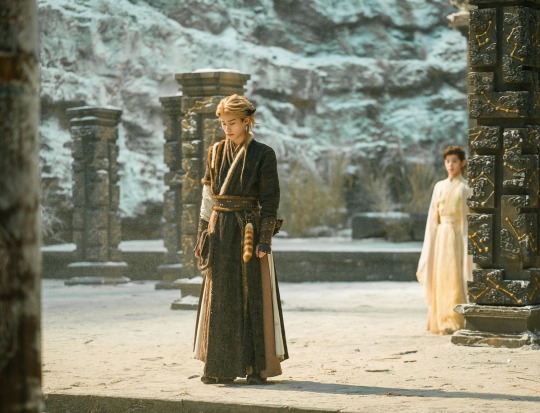
So I've read on MyDramaList that Bai Jiu was supposed to be older in this, but since the team was afraid that the relationship between Ying Lei and him wouldn't pass censorship, they made him much younger.
I don't know if this is actually true, but it would explain so much of Ying Lei's behavior towards him. I mean, of course you can interpret their relationship to be strictly friends-only, but in a drama as queer as this one I think it's only fair to consider all the options here.
Remember the 'cutting sleeves' comment when they parted for the first time on Mount Kunlun? By now it has become shorthand for gay love in Chinese media.
Bai Jiu refuses him in that scene, but that doesn't change Ying Lei's love for him. He can't help the silent jealousy when Bai Jiu prefers the company of other people to his, nor can he stop being there for him, preparing gifts for him and repeatedly sacrificing himself to protect him – and, finally, getting him back.
The way they had to pry Bai Jiu from Ying Lei's iron grip after he was saved in episode 30 really cemented that one-sided love for me.
So there could have been so much more to this relationship but since Bai Jiu is a kid in this, all the things he says and does to Ying Lei have been put in a completely different and much more innocent context.
But for Ying Lei, these feelings are still very much there, and I found it completely impossible to deny their existence.
#just some thoughts I had to write down because they've been driving me INSANE these past few weeks#Fangs of Fortune#Ying Lei#Bai Jiu#C-drama
71 notes
·
View notes
Text
Listened to a podcast the other day discussing Season 6 Episode 2 with Jesse Inocalla (Voice of Soren) as the guest, and one part of it really reminded me of why I love Soren and Corvus, either as a romantic pair or even just as a friendship.
To summarize, the theme of the episode that the podcast picked out was the theme of acceptance, and Jesse Inocalla picked the last moment, where Corvus says "A good man with a big heart" to analyze through that lens. And he talked about Soren, who has wanted nothing more than to be loved as his complete self, not just as parts of himself (a crownguard, someone who is silly, someone who has gone through everything he has, etc.), and Corvus really being one of the first people to express that kind of love and acceptance towards him.
But then the host of the podcast asks Jesse about who is doing the accepting in that moment (as per the theme discussed), and I was surprised when Mr. Inocalla answers that Corvus (I believe part of his response were the words "fuck it, we ball" regarding when Corvus finally returns the hug after being caught off guard), and that speaks so much to this dynamic they have. Corvus, who is not big on physical affection, would say "fuck it, we ball" to a big hug from Soren. We see a little of his discomfort at the beginning of the episode when Soren (literally) picks him up. But in this moment, there is only a second of that, before acceptance. Acceptance of that affection, and accepting what Soren means to him, and what he means to Soren, and letting that vulnerability happen.
That's why Sorvus, or platonic Soren and Corvus, or whatever, has captured my heart so much. I just love them to bits.
Here is the link to the podcast, if you want to listen: https://podcasts.apple.com/us/podcast/acceptance-tdp-s6e2-love-war-mushrooms-w-jesse-inocalla/id1486277624?i=1000665962366
(Also, Jesse Inocalla and Omari Newton (Voice of Corvus) apparently talk a lot about their characters together. Sirs?)
#the dragon prince#the dragon prince s6#soren dragon prince#soren tdp#corvus tdp#corvus dragon prince#Sorvus#love them so much#Also#I have a very delectable treat in the works so keep an eye on the sorvus tag on Ao3#teehee#My hyperfixation is being kept alive just long enough for me to edit and post it#then I fear it will be dragon age time#until december of course#then the brainrot will continue
104 notes
·
View notes
Text
Little Moments in S2E2 of Heaven Official's Blessing
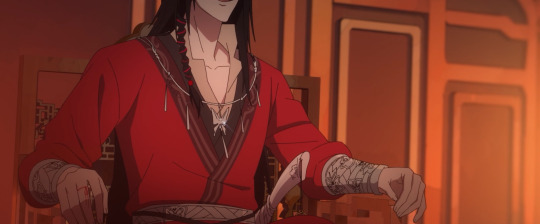
San Lang's jewelry sparkling when he's amused (?) by something. This one happens when the ghost gambling bets his daughters life. Reminds me of an anime glasses character's glass shine. this happens several times through the episode and is usually accompanied by a high pitched metallic sound. Like the chime of a sword unsheathing.
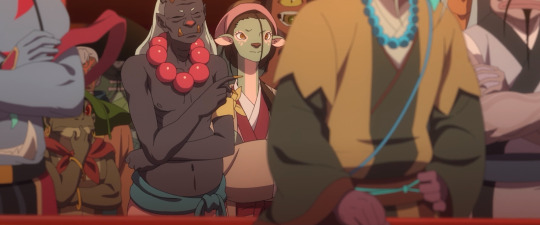
The green deer demon girl is adorable. Loving the frog man too.
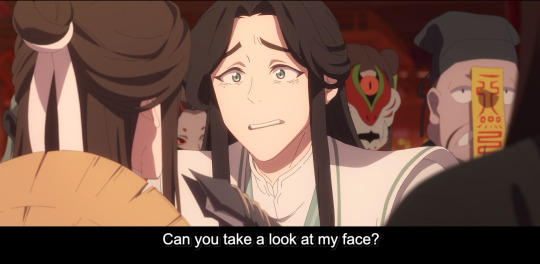
The wind master genderbending back into a man after being dragged to a ghost spa with the undead women and freaking out about what kinda of products they used on his precious skin.
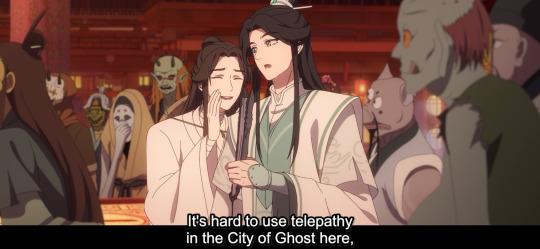
Xie Lian physically grabbing the wind master to keep him from slipping away to find a mirror. You're on a potentially life or death mission my guy. Bring a compact mirror on your next adventure. Fast thinking on an excuse by Xie Lian though!
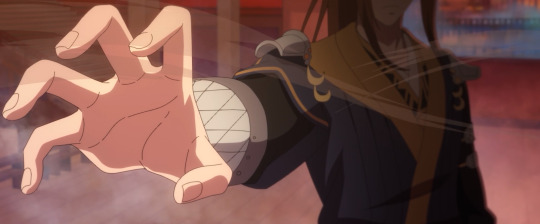
This guy having zero points in stealth on a mission that the emperor himself said must be handled discreetly to avoid conflict with the ghost realm.
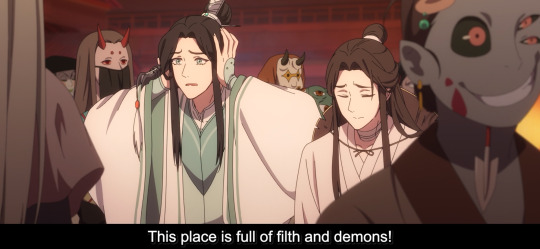
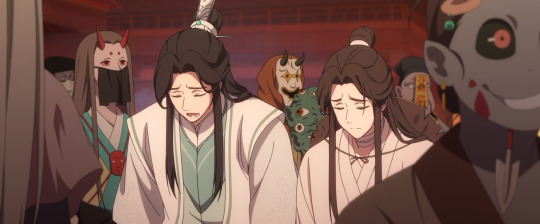
I love how they both panic, than immediately accept Qianqiu's imminent death at Hua Cheng's hand after he continues to insult the man in his own establishment.
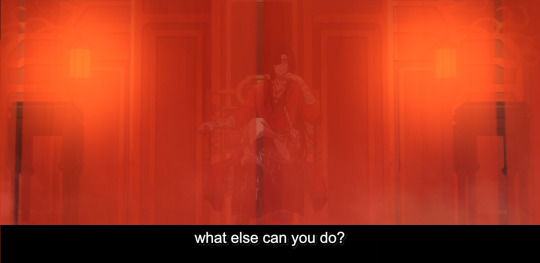
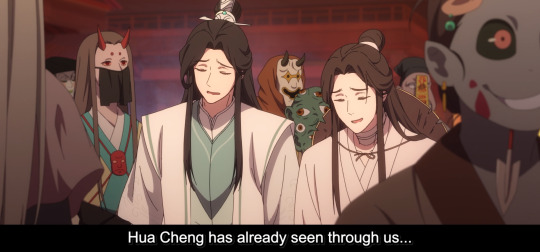
'This place of mine is meant for revelry. If you don't want to take the path to heaven, and break into hell, what else can you do?' Hua Cheng revealing that he knew who they were already. Which isn't surprising because they all stand out enough as is, even if his husband wasn't with them and standing within within eyesight.
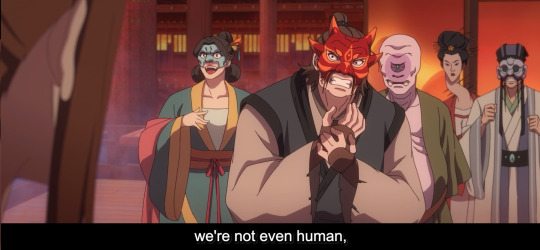
Respecting the demons/ghosts for calling out Qianqiu when he said they're lacking humanity and decency. Like 'Bruh, We are literally NOT human. We don't share you're morals or sense of decency at all. Just let us live our lives.' Like, I'm actually in agreement with them.
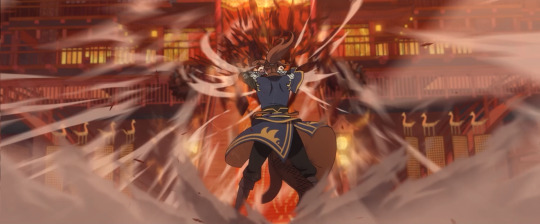
Getting into an air bender battle, while San Lang is barely flicking his wrist at him. I like how San Lang crushes the table and sends the shards flying at him. Showing he could easily impale Qianqiu before pulling him up at the last moment. It felt like San Lang was trying to teach him. He might have recognized that Qianqiu was young and foolish, but was trying to do good. So San Lang warns him by showing him what could happen if he keeps running his mouth without knowing who he's threatening. That or he decided not to dice Qianqiu because Xie Lian was watching... could go either way
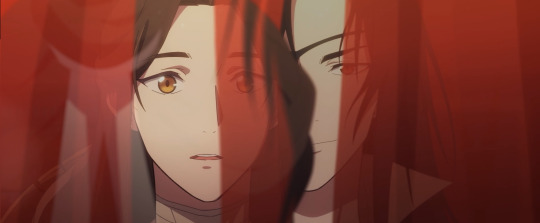
HuaLian having a tender moment looking into each other's eyes while everyone waits downstairs confused.
San Lang 100% offered Qianqiu as a prize to give Xie Lian the chance to help him and Him the chance to hold hands with Xie Lian X'D
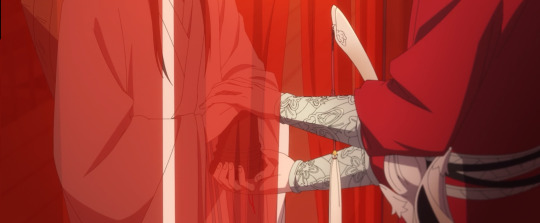
We hear that metallic chime noise again here. I think San Lang gave Xie Lian some of is luck here. San Lang also holds Xie Lian's hands on the final round too when Xie Lian rolled two 6's and wins.
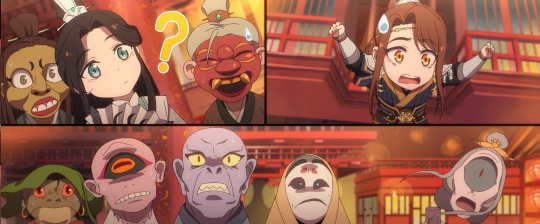
Everyone's reaction to San Lang calling Xie Lian 'Gege'. Qingxuan is curious and confused. Qianqiu looks shocked and a little embarrassed. and the grandma Pleakley looking demon's head falls off their body.
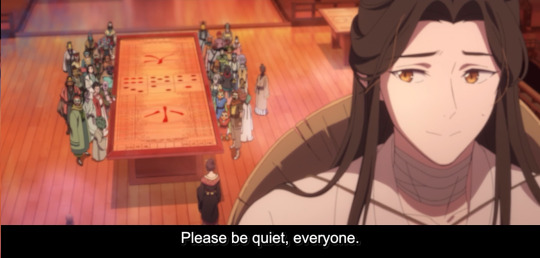
San Lang telepathically ordering his assistant to have everyone STFU while he's playing with Xie Lian.
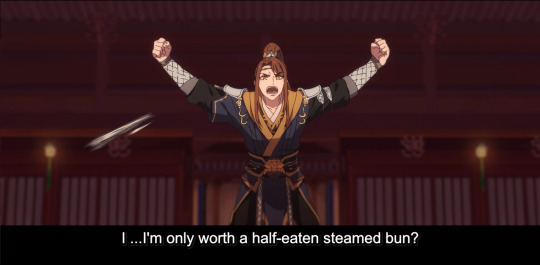
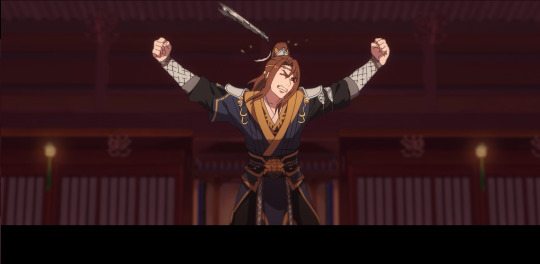
Wind Master Qingxuan pelting Qianqiu with his fan for continuing to run his mouth.
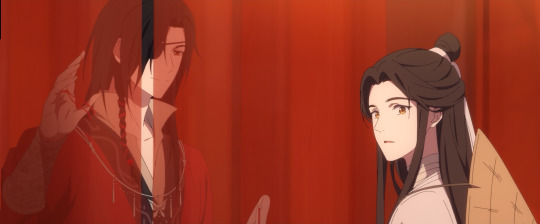
San Lang being completely smitten with Xie Lian as he drops a man from the ceiling
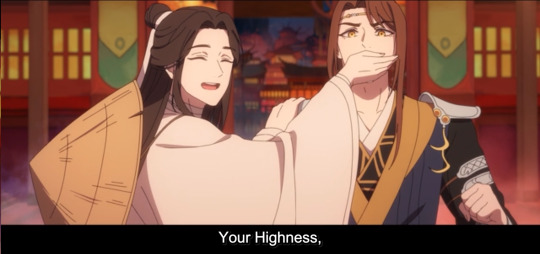
Xie Lian making Qianqiu shut his mouth. Dude BE QUIET! They JUST saved you.
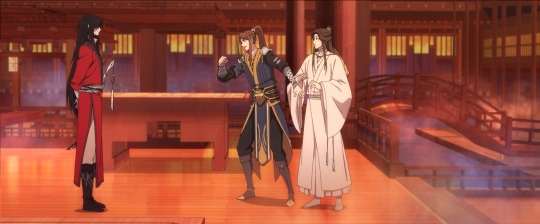
It was incredibly sweet how when San Lang approaches Xie Lian asking for the bet he's owed, Qianqiu steps between them and holds his arm out to protect Xie Lian from who he perceives to be a threat. Qianqiu knows he wouldn't win, but he moves to protect Xie Lian anyway. He's so foolish but so brave.
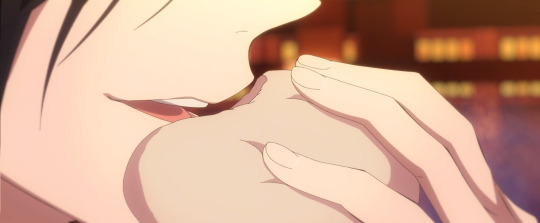
San Lang would eat stale pringles off the floor if Gege touched them,
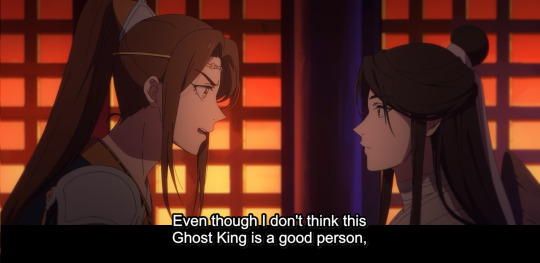
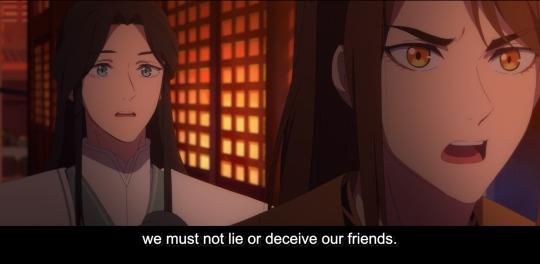
Prince being to good for his own good again by telling Xie Lian not to lie to Hua Cheng. Despite himself not liking him at all for treating him like a pinata prize in front of everyone.
This was a very cute episode and there were so many enjoyable moments.
#shi qingxuan#tgcf#lang qianqiu#heaven official's blessing#xie lian#san lang#hua cheng#tian guan ci fu#hualian
176 notes
·
View notes
Text
Leo the Leader vs Leo the Learner
I know almost every iteration of TMNT emphasizes that the boys cannot properly function as a team without everyone there, especially without their fearless leader.
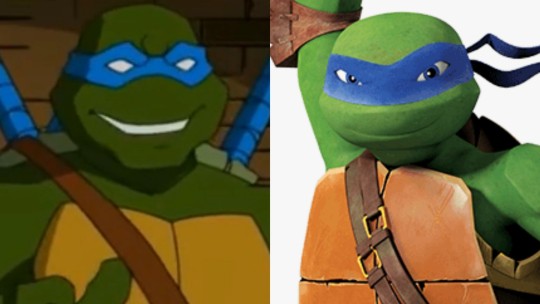
In terms of cartoons and movies though (as much as I've had time to watch/rewatch), the '03 and '12 series are my personal favorites, with Rise and MM tying for a very close second, because they both acknowledge issues in the team that the characters work to fix. '03 Leo and '12 Leo both struggle to lead the team at significant points in their respective stories, but the manner in which they struggle and what they struggle with differentiate, in a good way mind you.
In the 2003 series, the very first episode opens with Leo already being in the leading position as he tries to keep his brothers from going off script or doing something irreparable while they work to find Splinter. And when they do eventually find themselves in trouble, he's the one to lead them through it and make it back to Splinter in one piece. We see this formula more or less repeat for almost three seasons with a few different variables to spice things up; the brothers look to Leo for guidance, think of a plan of action with their combined efforts, and go from there.
Until the S3 finale.
The boys had times where they wondered if they'd make it out alive, but this was the first where it genuinely seemed like the end for their little family, and Leo could do nothing but watch as they execute their plan to blow up with the starship.
Of course they survive, otherwise we wouldn't have another four seasons💀but that short amount of time was more than enough to scar Leo, physically and emotionally. When he begins closing himself off from everyone, April's the only one to get him to open up and he lays it all out: He feels like a failure of a leader. He wasn't strong enough to protect his family or stop the Shredder, their last resort was going out with a bang, and they had to be saved by the Utroms. It doesn't feel like they won and he doesn't feel like he accomplished anything.

His fears and frustrations manifest into an ever present anger, slowly going from cold to hot, that chooses its target at random. His brothers don't know what to do since they don't seem to know why Leo's behaving this way, nor have they ever seen him like this. And dear Mikey says something that so accurately sums up their team: "...it can’t be fun always being the responsible one, and we’re the ones who really benefit. Raph’s free to not think ‘cause Leo does all the thinking for him. Don’s free to dream, and I’m free to take it easy, all ‘cause Leonardo is busy being responsible enough for all of us."
Mikey knows Leo is cracking under the pressure of his role partly because they've become so comfortable in their own roles, and no one refutes him. They didn't intend for Leo to translate this dynamic into, "everything is on you," but that's how it inevitably turned out over time. One could even argue that them not knowing how to handle this new Leonardo is yet another downside to them getting too comfortable, and it doesn't help that Splinter is the only one (aside from Usagi on one instance) who attempts to help Leo, even when the young turtle is pushing him away.
Things finally boil over when Leo pushes a little too hard though and harms Splinter during training, a regrettable action that clears away the steely air he had around himself for so long.

It's not until Splinter sends him off to see the Ancient One that Leo finally pulls himself out of that bubble of negativity and he accepts that there was nothing more he could've done in their final fight against the Shredder.
He did all that he could, and he can continue doing all that he can for his family.
In a weird way, Karai's violent eviction notice was exactly what everyone needed.
Leo was told his family likely hadn't survived the attack, something he'd spent countless days trying to prevent through relentless training, but he believed they were okay and ultimately found them alive. He wasn't there to protect them, but he sees for himself that they made it out without his help, and this was also a learning experience for the others if you think about it. They've already been shown to be capable of handling situations on their own or in pairs, but this was the first time they had to deal with a huge confrontation as a team without the comfort of their leader behind their shells.
Raph is the one who takes the helm for a brief few seconds and dishes out instructions amid the chaos, telling everyone to split up, find their way out and meet back up on the surface, with one last demand for them to be careful. And when Leo finds him, his distress is palpable; he couldn't find the others and therefore had no idea if they were okay, let alone alive, while he kept himself hidden from Karai's forces. Before this, we see that Raph is willing to make his own plan of action in this series' version of City at War when he doesn't go with Leo's word. But this time, in Leo's absence, we see he's willing to fill in as leader when the situation calls for it, and he realizes he isn't quite cut out for leadership like Leo.
We don't see any significant shift in team dynamics after this, mainly because Leo's inner turmoil from their fight with the Shredder is what caused problems with the team in the first place, but that goes to show that outside influences are what gave birth to the team conflict. Despite me pointing out earlier how Leo shoulders quite a bit not just because of his role but because of his brothers' roles as well, we can see throughout the series that Leo doesn't buckle from the pressure until they're in a situation where he can't effectively perform his role to his satisfaction.
As I mentioned in the beginning, Leo had been a leader in essence and in name for many years before their first home was raided by the Mousers. It makes perfect sense for him and his brothers to be accustomed to it by now.
2012 Leonardo is not used to being a leader. He may undeniably be a leader in essence, and had the drive and desire to be one, but he definitely wasn't a leader in name. The very first episode doesn't even open up with Leo being a leader, let alone with the turtles being a team. Their first time fighting together is a train wreck, and rather than Leo's strong sense of ethics and honor being the catalyst for his recruitment (not at first at least), it's the beginning of their long battle against the Kraang that convinces Splinter to officially deem him the leader of a newly formed team.
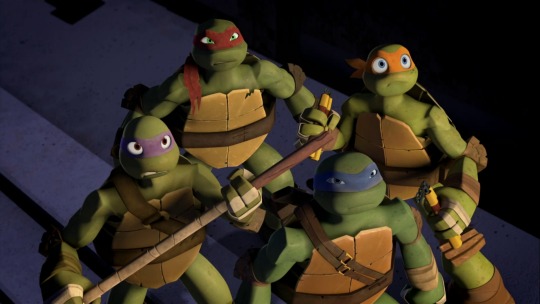
Being leader doesn't automatically mean the team will follow or respect you, which is something Leo learns right away thanks to his brothers, with Raph in particular challenging him when they butt heads over their opposing plans and ideals. It's touched upon in Rise of the Turtles Part 2, but Raph's desire to lead isn't a major plot device until New Girl in Town where he gets a taste of how Leo feels everytime he's responsible for his brothers and their wellbeing. However, Raph makes it known that even though he's resigned himself to not being the leader, he still doesn't like being told what or how to do something. Even Donnie challenges Leo when they can't agree on the best course of action in preparation for the Kraang, but Donnie realizes arguing was pointless as the invasion begins without warning and makes the idea of a second base the more favorable option.
His brothers aren't his only test of will though, as there are a handful of times where Leo questions his ability to lead and wonders if Splinter chose the right turtle for the job. Throughout all of that though, the boys ultimately rely on Leo and follow his lead when all is said and done.
Where this Leo truly differs from '03 Leo is that he not only struggles with leading a team that isn't so keen on being led, but he also struggles to grasp that he leads a team.
There are many times in the series where Leo runs off on his own or makes the decision to tackle something himself rather than with help, and that's not out of the norm, especially in comparison to his own brothers and '03 Leo. The problem is that '12 Leo's solo decision making more often than not leads to trouble (we all know the tale of him trying to turn Karai to the good side without informing the team about her). One of the first major examples of this though was in the S1 finale when he takes Splinter's words a little too close to heart and gives his brothers the scare of their life. Granted, him holding back Kraang Prime kept it on the sinking Technodrome, but you get what I'm saying.
His family actively calls him out on this behavior on two separate occasions during S4.
After they'd spent six months with the Fugatoid fighting the Triceratons and racing to collect every piece of the black hole generator before them, Fugatoid reveals that he was the one who made the world ending device, a reveal that lights a flame of betrayal in everyone, especially Raph and Leo. Believing that they're being used by Fugatoid, Leo rides off in a stealth ship on his own and nearly gets himself killed, a move that has his brothers scolding him, with Raph being the most vocal about Leo's idiotic decision: "Leaders are called leaders because they're supposed to lead a TEAM!"
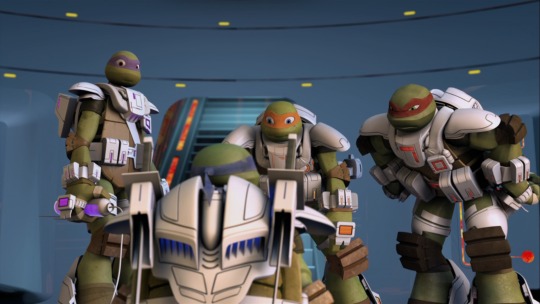
The moment isn't lingered upon for long, but they all make it clear that they're tired of Leo's one man missions. They're a team, so they should plan and function like one.


Then, in Broken Foot, Leo starts doing missions with Karai and Shinigami in secret to aid them in taking revenge against the Shredder, but, in an attempt to find out what Leo was hiding from them, the other turtles get caught up in their plans and Donnie gets hurt. Leo immediately abandons Karai (who later apologizes for what happened) and Shinigami to check on them and come clean.
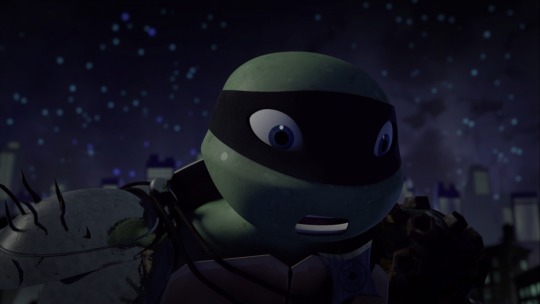

He explains to Splinter later on that he didn't fill anyone in on the situation at first because he knew no one would've agreed to help Karai get revenge, and he acknowledges that it was stupid of him to think he could control the situation. Splinter expresses his disappointment, and April reprimands him for once again not trusting his own team enough for them to help him.

Leo apologizes to Raph and Mikey afterwards, even going so far to say he probably doesn't deserve to lead the team after this, something Raph just harumphs at while Mikey remains silent. He pleads for their help in stopping and eventually aiding Karai and Shinigami, and they go along with him to fix things as a team.
We no longer get any one man missions from Leo in S5 (there surprisingly weren't any in S3 lol), likely for a whole list of reasons ranging from leading in Splinter's absence to learning from his mistakes over time. But he makes sure that whatever they have to do gets done together, and he does his best to keep his brothers in line.
I suppose one could say that '03 Leo remembered what it meant to be a leader, while '12 Leo discovered what it meant to lead.
#tmnt#teenage mutant ninja turtles#tmnt 2003#tmnt 2012#tmnt 2k3#tmnt 2k12#tmnt leonardo#tmnt leo#2003 leo#2012 leo#analysis
343 notes
·
View notes
Text
"Thank you for waking me up from my nightmare"
"It's my duty as your lover"



After reading @secriden post here about how prapai takes "it's okay" and doesn't say it to say it! but as he says he shows sky with his actions. It reminds me of every time i watch episode 13 and I get to the ending scene here when sky tells prapai thank you for waking me up from my nightmare listen that THAT is so emotional, it leaves you honestly so misty-eyed cause sky is truly saying he is able to finally begin to rest. Something he hasn't been able to for a very long time. This has been a reoccurring nightmare for him and early on in the story you can see sky accept it for what it was.That this was his life now that he's going to have to just have these sleepless nights he's never going to rest. He's gonna comfort himself and tell himself it's okay though he doesn't believe it for a second.
Sky doesn't rest and so as a domino effect when u don't rest u don't stay healthy. We see sky neglecting himself he doesn't eat or often forgets to. It's so bad that he drives himself to be sick. And He's forced to actually not work and rest or atleast attempt to. Cause when he's sick the nightmares dont go away till pai stays with him that night and day. Holding his hand not leaving his side.
Sky has accepted that love is not for him as I said before it's a trigger for him just a clear threat in plain sight. And so he's accepted that he's not going to think for a second waste any thought or time that he's even actually worth of thinking that someone will actually be serious about him. Let alone believing that someone will find him endearing and cute and just wants to dote on him constantly. Not when sky doesn't believe it himself he doesn't think he's anything special handsome beautiful.
But meeting Pai and sky truly seeing what he deserves!! Seeing love truly in its most selfless and most beautiful ways while also being reciprocated! Pai didn't fix him as people like to say but he gave sky that second chance of hope just a simple try. Try to open your heart to me, try to see me as not someone who's going to hurt you, try to allow yourself to trust yourself and your feelings. And sky felt feelings as we saw that he tried to deny and play it off and tell himself constantly it's nothing it won't be anything prapai is the last person on earth to be ever serious about anyone. With all the while we saw how he likes how pai has been cheesy with him very consistent with how he's been showing up. He shows up even on the days when sky doesn't think he will hence when he's sick at the freshman orientation project. But he does even when prapai physically isn't there just with the simple lunch, dinners on his doorknob as a reminder for him to eat. I think it's so beautiful that sky is able to finally say that he can rest and allow himself to begin the healing process.
With a partner who has the utmost respect for him. Whoever loves him more than anything in the world and would do anything for him. Prapai is constantly overwhelmed with his love for sky it's so endearing. He tells him how his smile and hugs makes his day. Sky could now go to sleep with the man he loves and wake up with the man he loves in his arms. Even simply just laying in bed with him and his heart will immediately just felt like ease in this safeness. He doesn't have to second guess it cuz he's confident in his relationship and the love they have for each other. The nightmares have taken so much of his life. It's time for him to fully rest and embrace this calmness and warmth that he thought he would never feel from anyone is so touching you really think about when he says that to him.


Prapai saying it's his duty! As in it's his absolute honor to take care of him he doesn't see this as a burden or an inconvenience or hindrance. What sky went through won't just go away and they know that. But prapai has put in the work and will continue to make that commitment to them. They will continue together to grow together while building their relationship.🥺
#fortpeat#fort thitipong#peat wasuthorn#prapai x sky#prapaisky#skyprapai#sky x prapai#lita#love in the air#love in the air the series#love in the air series
43 notes
·
View notes
Text
I feel the most upset over Mel though... realised this when i saw how my fellow fujoshis have reacted to her involvement in jayvik jdfhgfd, the Viktor parallels that i have always enjoyed and pointed out before are now treated as Yaoi Proof and nothing else. ...because well yeah they lead nowhere else this season sadly, her relevance was cannibalized by her future league iteration and by fandom's reductive approach to shipping. To me the parallels used to be interesting because Viktor and Mel in s1 were polar opposites in social standing/background & physical health and visibly disliked each other BUT they were more or less on the same page when it came to their rather centrist but ultimately pacifistic beliefs, and they both were enamored by Jayce's ambition from the second they heard him talk about magic, inserting themselves into his life immediately. Those comparisons and visual symmetry were compelling because Jayce was lowkey trying to find a way to unite the two most important people in his life (telling Mel about Viktor's importance to him, trying to get Viktor to accept his involvement in politics, having them in the room together) while technically opposing both of them ideologically by not caring that much either about applying hextech for the benefit of the Undercity or about Piltover's participation in global politics and preserving its neutral status. While initially it seemed like he had to 'choose' between them, ultimately their separate character journeys (Viktor with Hexcore and killing Sky, Jayce with Vi and killing a zaunite kid, Mel with hearing her mother's justifications of war) led them to be on the same page in the last episode of the season which was a cool twist. So logically for character growth they either needed to improve their relationships further or to have sudden conflict, right? ...but s2 ultimately went for... just getting rid of both Mel and Viktor entirely! Viktor's motivation to give himself more time to leave more of a mark on the world (and finally getting to feel good about his own efforts by focusing on the Undercity rather than working for Piltover's financial benefit) was overshadowed by Hexcore corruption and a sudden inexplicable wish to transform humanity into a hivemind, that's a different guy entirely. Mel's motivations ended up not mattering at all, the only progression was her hardening into a proper warrior, like sure yay... her vision for Piltover and her identity as a Medarda was rewritten by sudden magical powers that ultimately, yeah, also make her into a different character. She did have a brief argument with Jayce over seeing him as an 'investment' of sorts but they didn't even get to finish it and their relationship is just one big ? before Jayce fucks off to die alongside his one true partner, like all of their previous loving interactions were just a situationship they both easily moved past without even acknowledging it. Like sure yeah we got our yaoi fanservice but at the expense of female characters and previously established relationships and plotlines... And btw there's a lot to be said about the cowardly approach of the showrunners to once again centering a 'male friendship and brotherhood' while getting pissy at anyone who might interpret it as romantic at the same time, as if a canon lesbian romance is a great excuse to be saying shit like that. Also imo timebomb pairing got more actual development and emotional investment compared to CaitVi in this season despite how hollow Jinx's character felt, so there's still a vibe that a hetero ship was more interesting to the writers... while the only things they wanted from queer ships were the aesthetic and the fan engagement.
#arcane spoilers#arcane s2 spoilers#arcane critical#jayvik#mel#long post#ranting#text#jayce as a cardboard good guy protag was also just not it
28 notes
·
View notes
Text
Izzy, Ed, and Saying “I’m Sorry”
I saw a post recently that said Ed’s apology (“sorry about your leg”) was fine actually, because that’s just how Ed and Izzy are, it’s just how they talk.
So I wanted to stress: that’s how Ed is. That’s not how Izzy is.
When Izzy apologizes, it’s: “I said some things I regret last night. I don’t think you’re a shell of a man or a twat.” And: “Ed, I’m sorry. I’ve been terrible to you. I fed your darkness. Blackbeard. For years I egged him on even though I knew you’d outgrown him.”
In S1 and S2 we see how izzy apologizes. He acknowledges his wrongdoing in specific “I” statements — “I did THIS, and I regret it,” “I did THIS, and it was a terrible thing to do.” When Ed apologizes it’s “Sorry about your leg.” Not “Sorry for what I did to your leg,” and no eye contact.
Some people think that Izzy’s response, “Fuck off,” is evidence that he doesn’t accept Ed’s apology, but I disagree — I do think Izzy accepted. I think it’s the most he’s ever gotten from Ed and he knows he’s not going to get anything better. Ed himself says he’s never apologized before, and only does it (not to Izzy but to the crew) when Stede makes him.
It’s worth analyzing how the two apologies are treated by the narrative as well. When Ed apologizes, all is forgiven; he gets his crew (“Ed, they love you”), he gets his lover and his happy ending. For Izzy, the narrative isn’t so kind. In one case, his apology is met with deceit from Ed — to prevent Izzy from further apologizing (by leaving the ship) Blackbeard lies to Izzy and says he plans to kill Stede, then maneuvers Izzy into doing it for him. Only to let Izzy be banished, because he never really wanted Stede dead in the first place. To recap, Izzy is mean to Ed in private; he gives a sincere, unprompted apology the next morning and tries to repent by leaving the ship; he is narratively punished with a humiliating duel and banishment.
In S2, Izzy apologizes to the crew by protecting them from the Kraken, and he IS narratively rewarded for this. His wordless apology results in love from the crew, acceptance, and support. It’s worth noting that we never see Ed make the same concerted effort to change his behavior. Stede tries to push Ed into it, but Ed resists — he rolls his eyes, he treats it as a joke, and he tries to convince his crew that they actually enjoyed being tortured. This is very different from Izzy, who quietly changes his ways without being forced or prompted.
In the finale, Izzy apologizes for feeding Ed’s darkness and absolves Ed for the way he mutilated Izzy in the S1 finale and first two episodes of S2. These mutilations are physical acts including multiple amputations and forced auto-cannibalism; Izzy still bears the scar from his suicide attempt following the final and most severe amputation. Izzy gives a high-quality apology for his mean words (“namby pamby in a silk gown pining for his boyfriend,” “I serve Blackbeard, not Edward. Edward better watch his step.”) Ed doesn’t apologize for choking Izzy, for cutting off his toes and feeding them to him, for shooting him or for goading him into suicide; he certainly doesn’t apologize for lying to him back in S1 about Stede. As we all know, while Izzy dies, Ed doesn’t apologize at all. Izzy gets only one apology from Ed in S2. It’s a low-quality apology vaguely referencing Izzy’s leg, without taking responsibility for it. Ed’s apology is the same distant statement of pity that we might hear from Lucius or Black Pete upon noticing that Izzy is disabled. “Sorry about your leg” — not as in “I’m sorry for what I did,” but as in, “Wow, it sucks that that happened to you. And it has nothing to do with me.”
It’s made worse by the fact that Ed can’t just apologize to Izzy. It’s Izzy who approaches Ed, awkwardly extending the olive branch. Ed rebukes Izzy for avoiding him and makes a judgmental comment about Izzy’s recent uptick in drinking, then seeks out Izzy’s reassurance/comfort (“It feels like a storm’s coming…”). Izzy refuses to give Ed the comfort he seeks, and it’s clear that this bothers Ed; it’s a departure from their usual dynamic.
Ed has to work up to an apology over the course of a brief conversation where the first thing he does is subtly reprimands Izzy for avoiding him. Ed’s priority is not to say he’s sorry; it’s to make sure Izzy knows Ed is upset about the silent treatment and then to seek comfort for Ed’s own emotional turmoil. Contrast this with both Izzy’s apologies: in S1, when Ed approaches him, Izzy squares his shoulders and apologizes right away. There’s no waffling about it; it’s clearly been weighing on his mind, and he needs to say he’s sorry before the conversation veers elsewhere. In S2, Izzy is literally dying; he asks Ed to stay with him, and then launches directly into his apology. There are no insults; there’s no cattiness; he doesn’t try to make Ed feel bad for being hurt.
Conclusion:
There’s a world of difference between Izzy’s apologies and Ed’s. The first difference is in the quality. The second difference is in how the narrative treats them. Ed’s low-quality apologies are rewarded. Izzy’s higher-quality apologies are punished with banishment and death.
199 notes
·
View notes